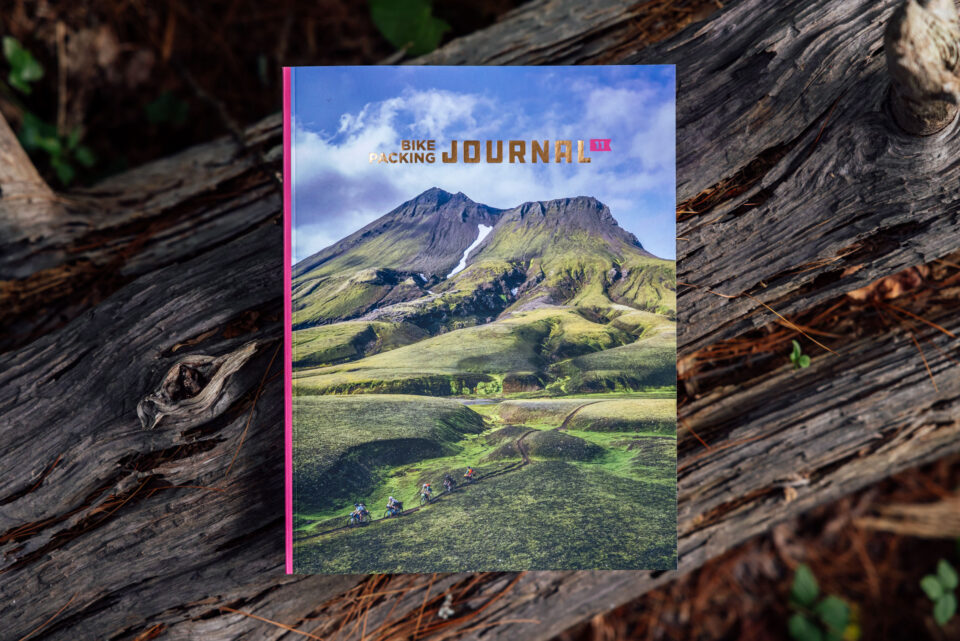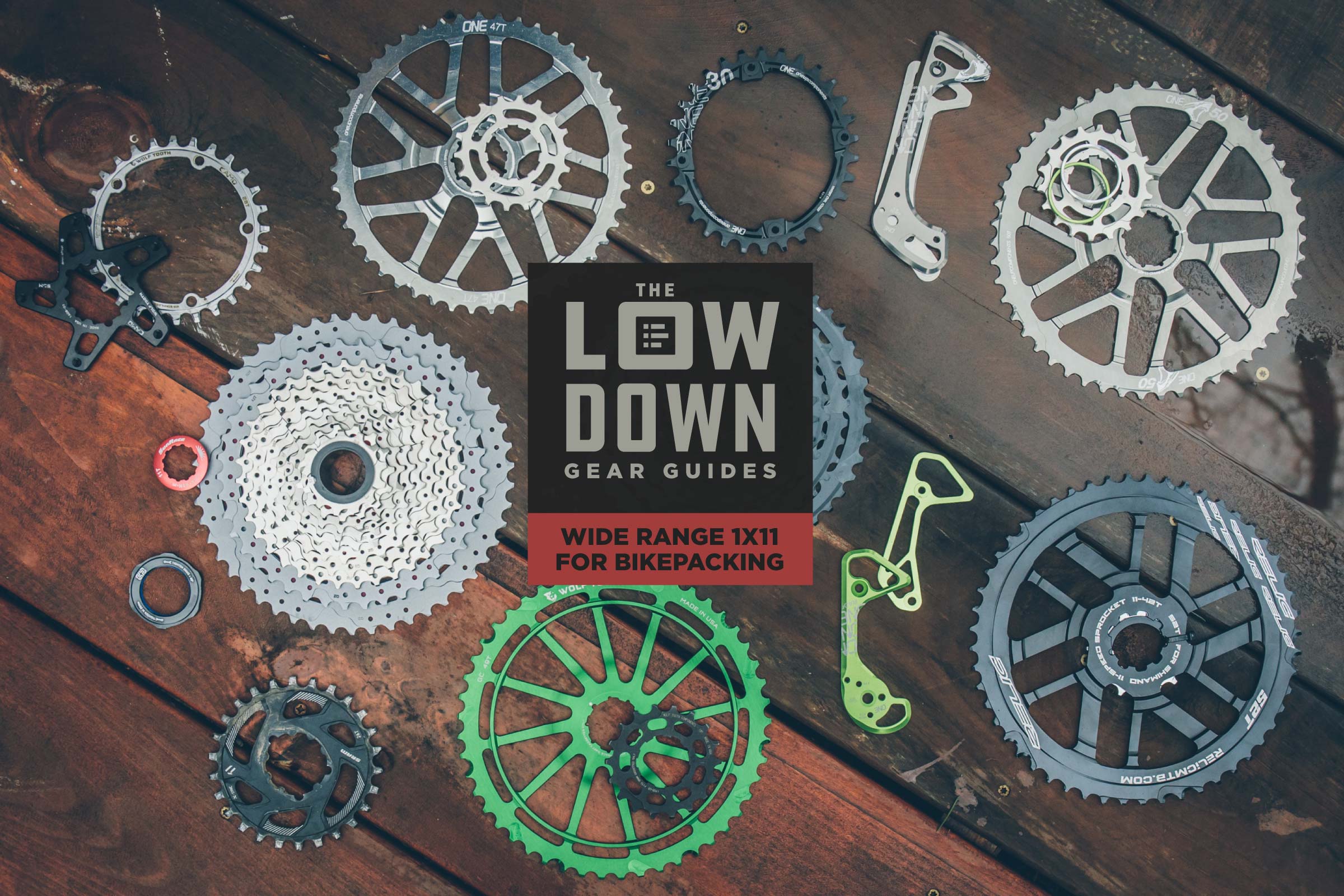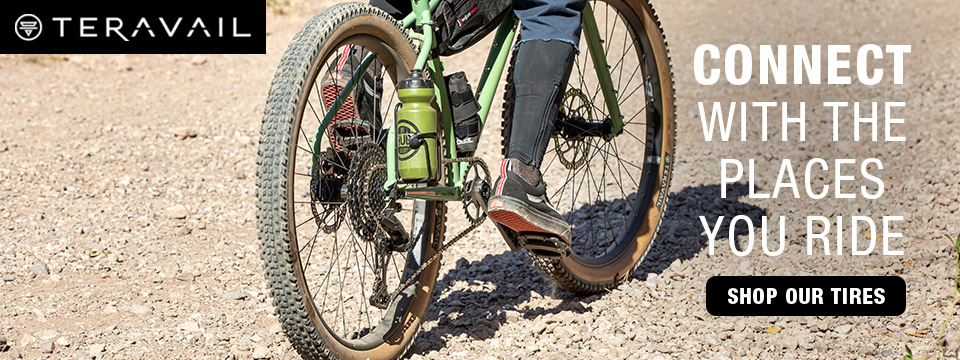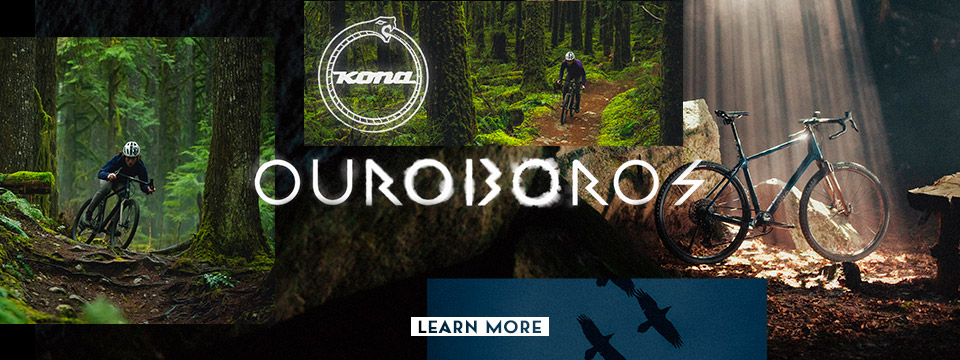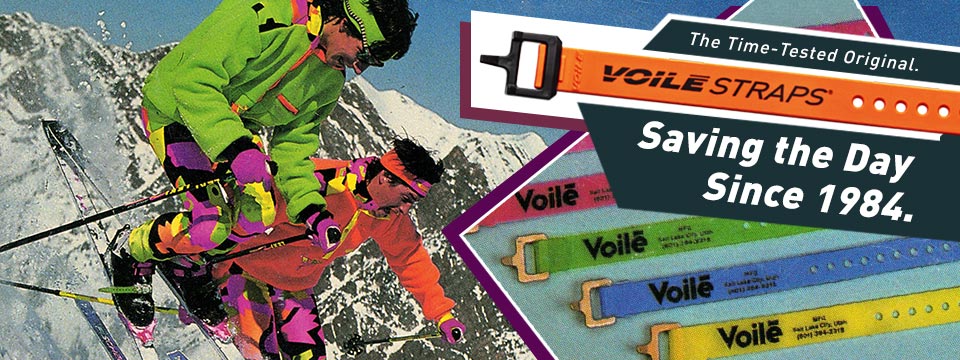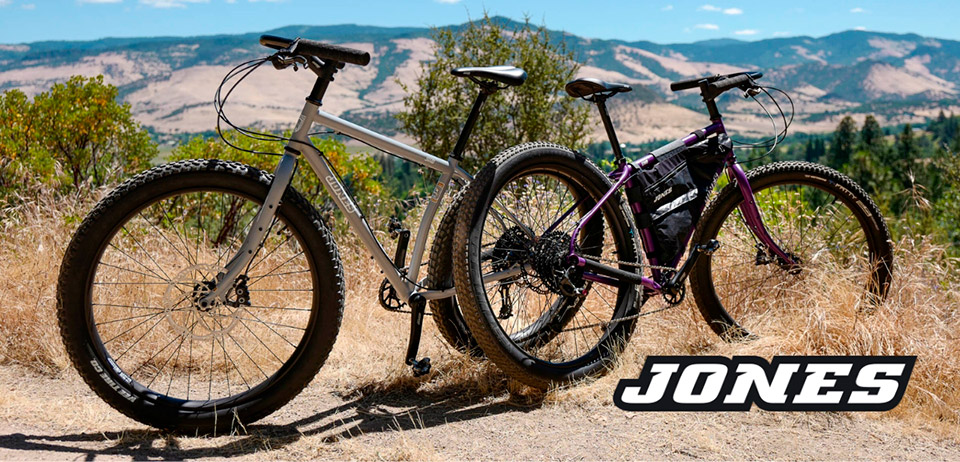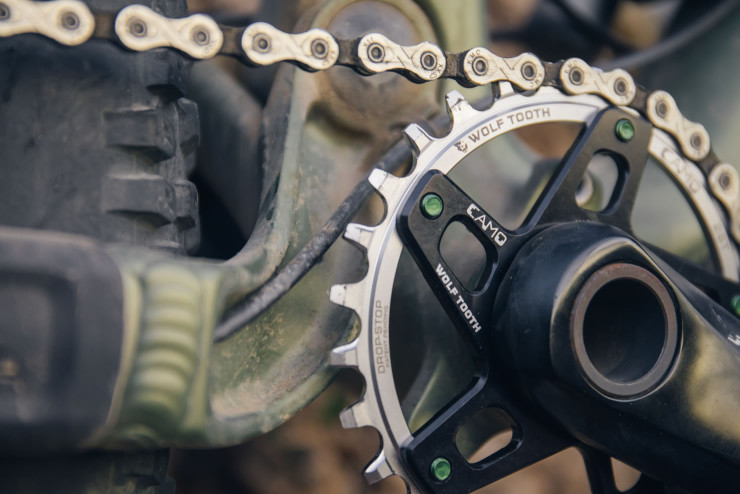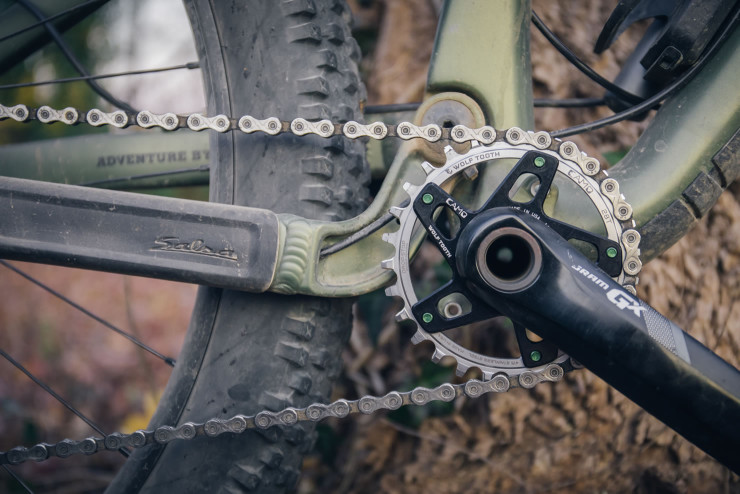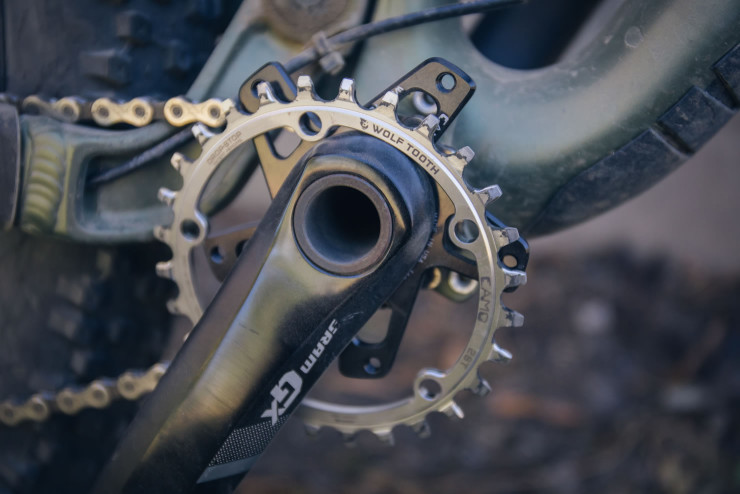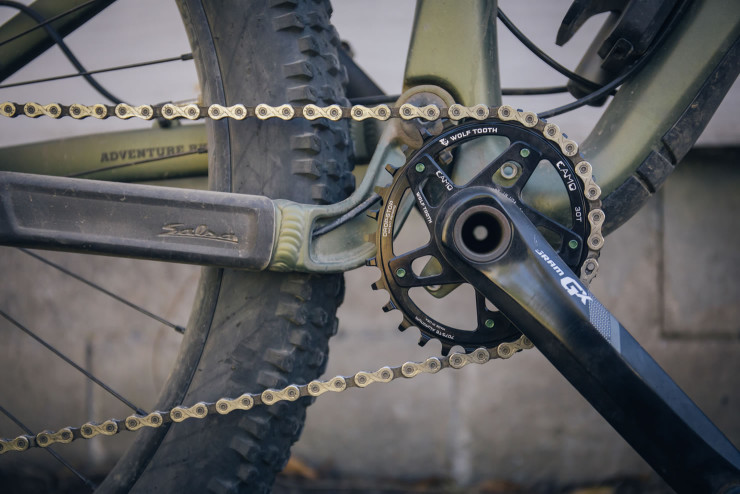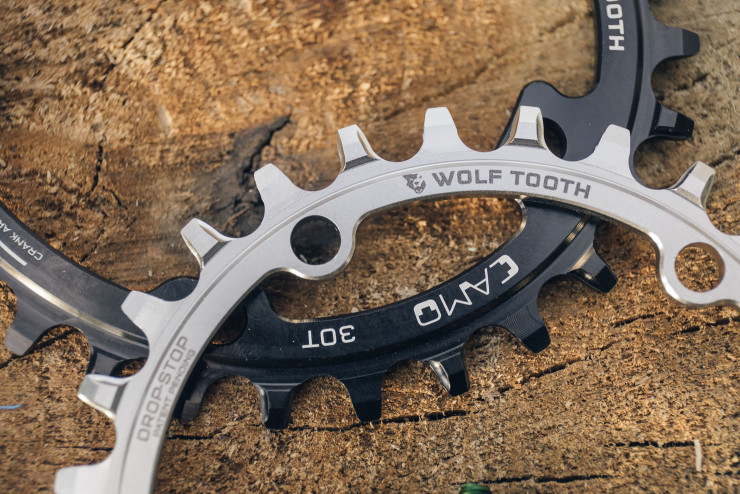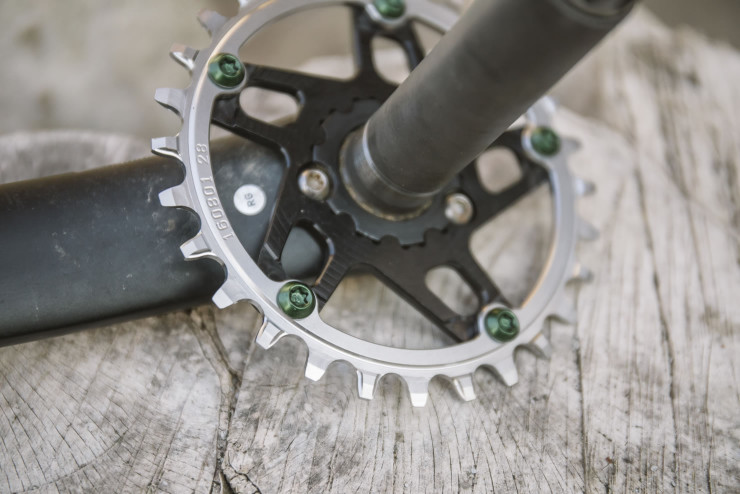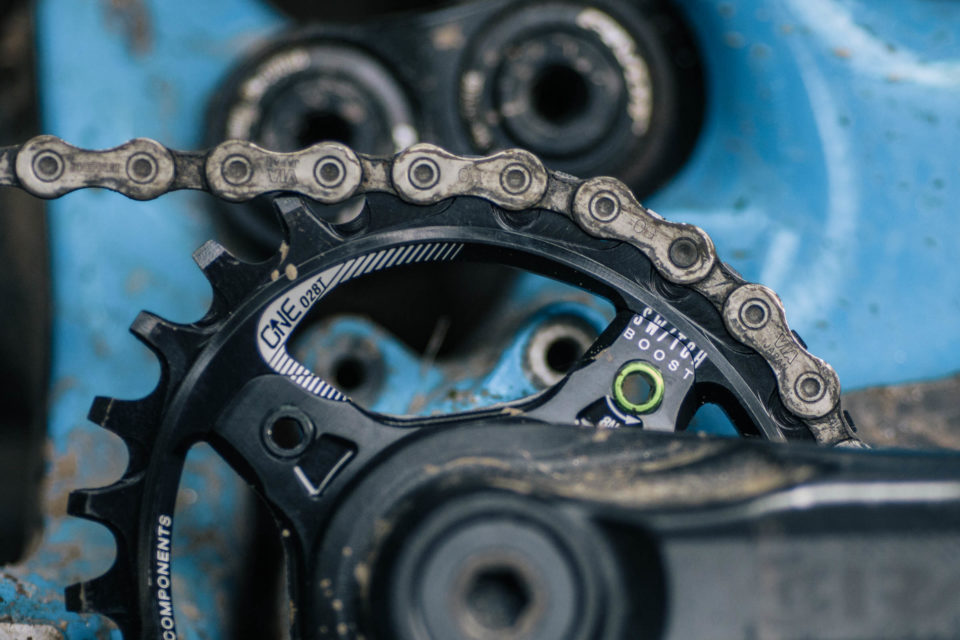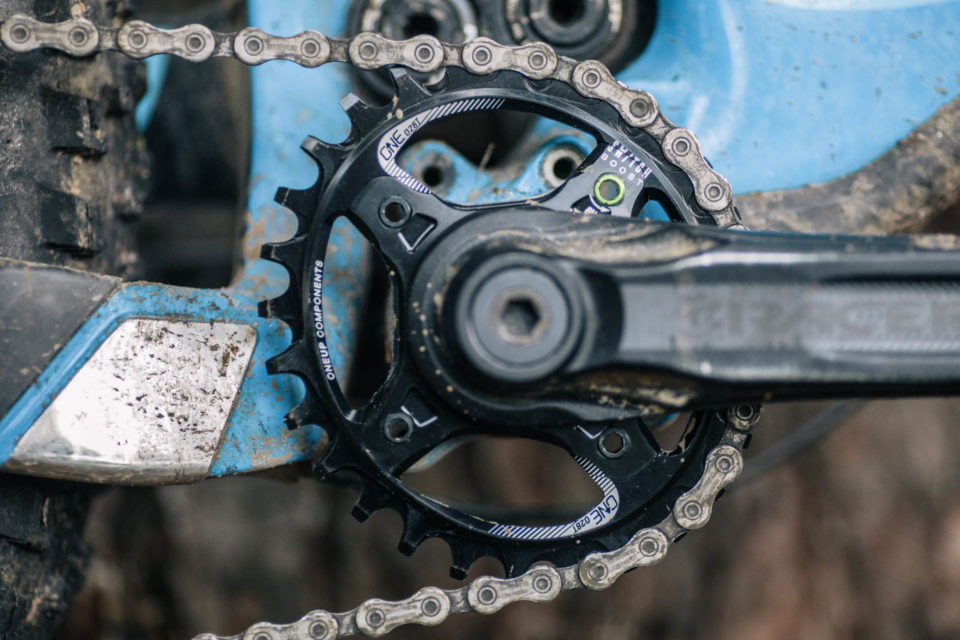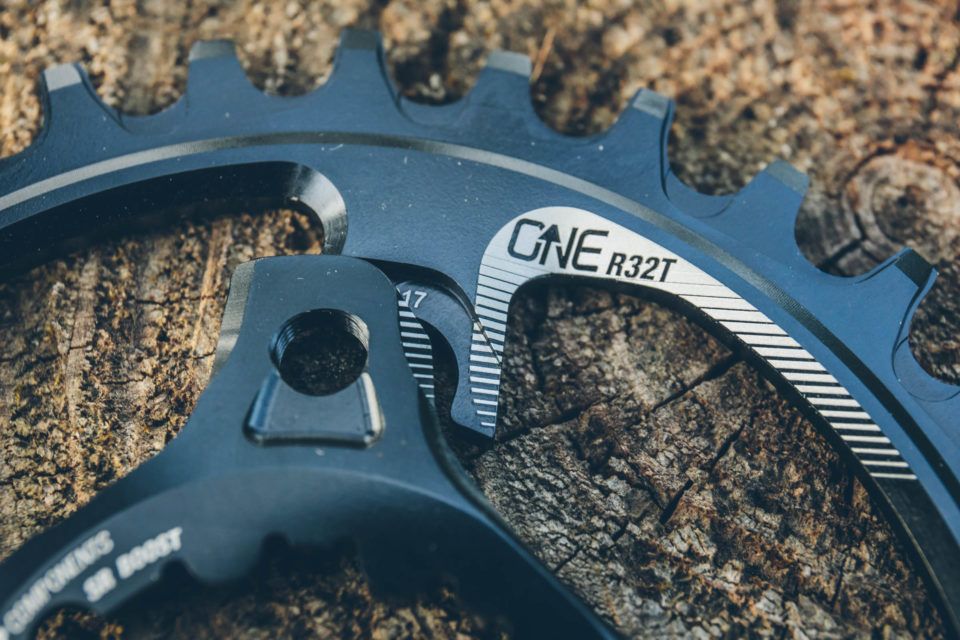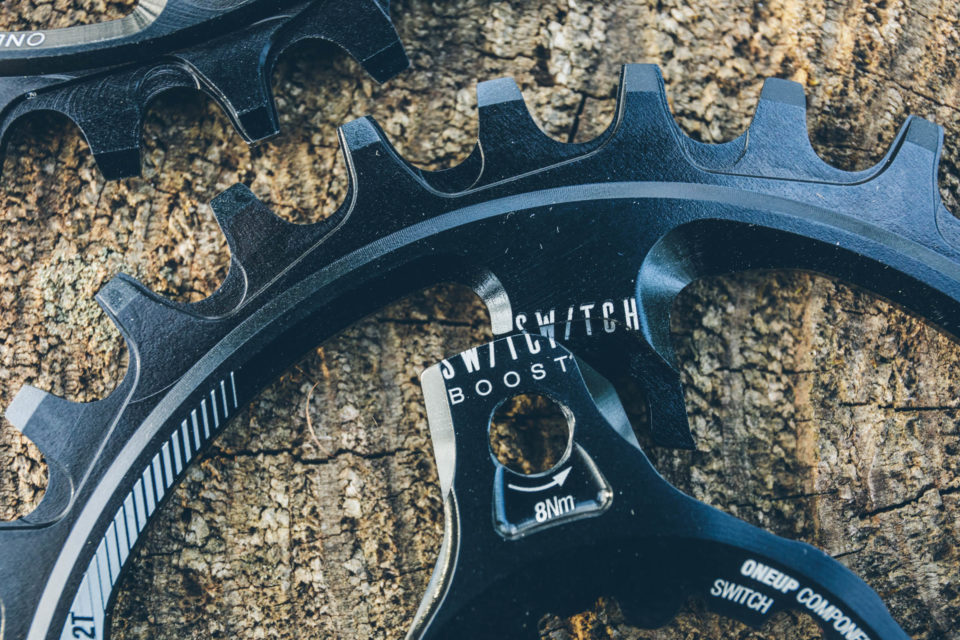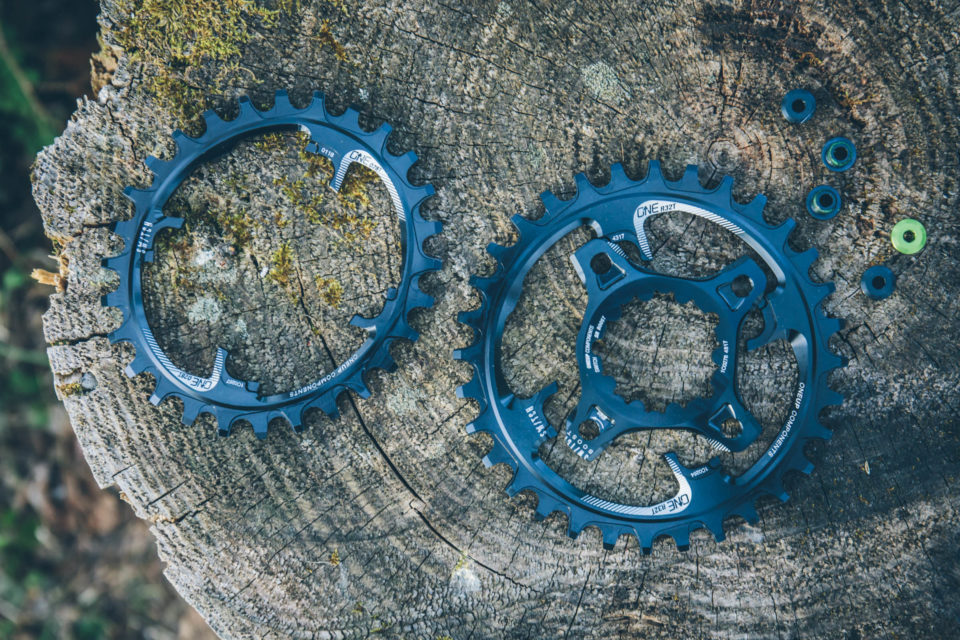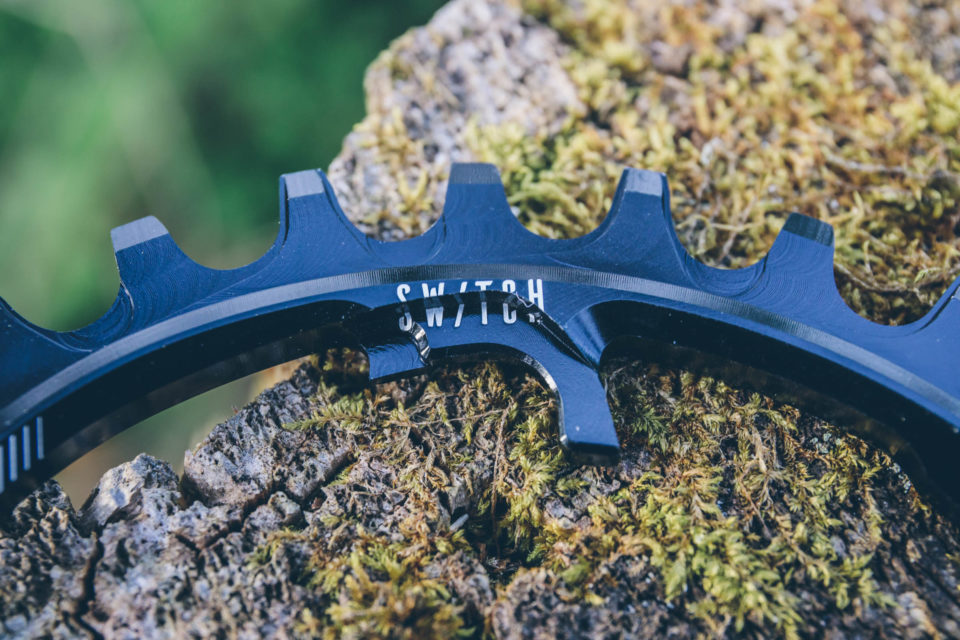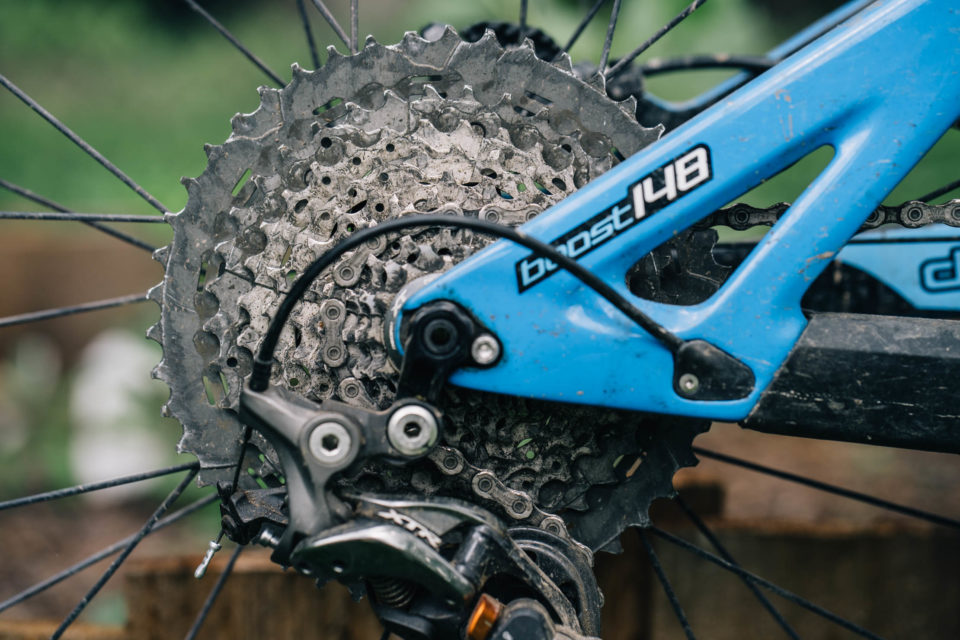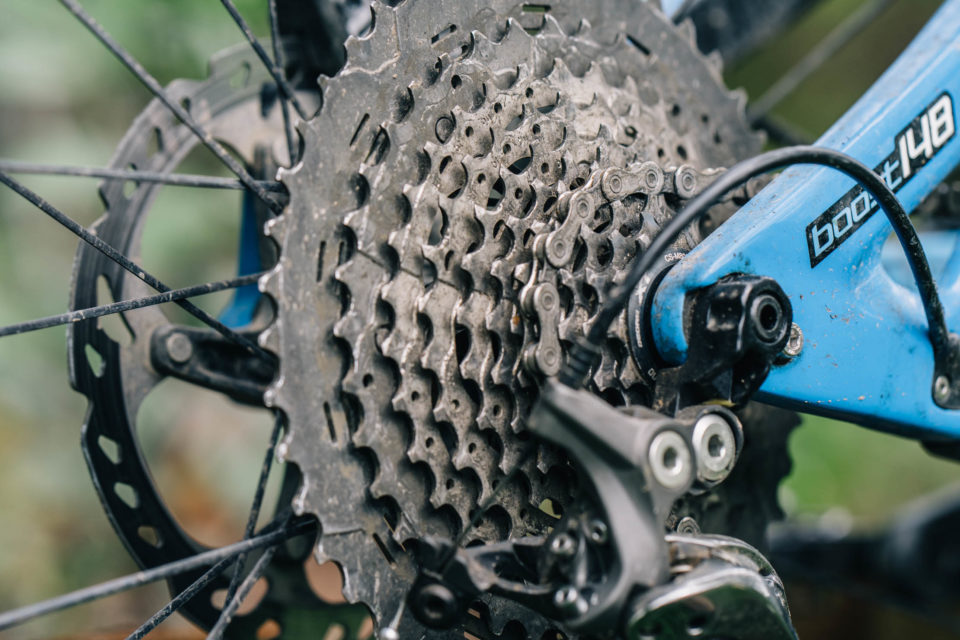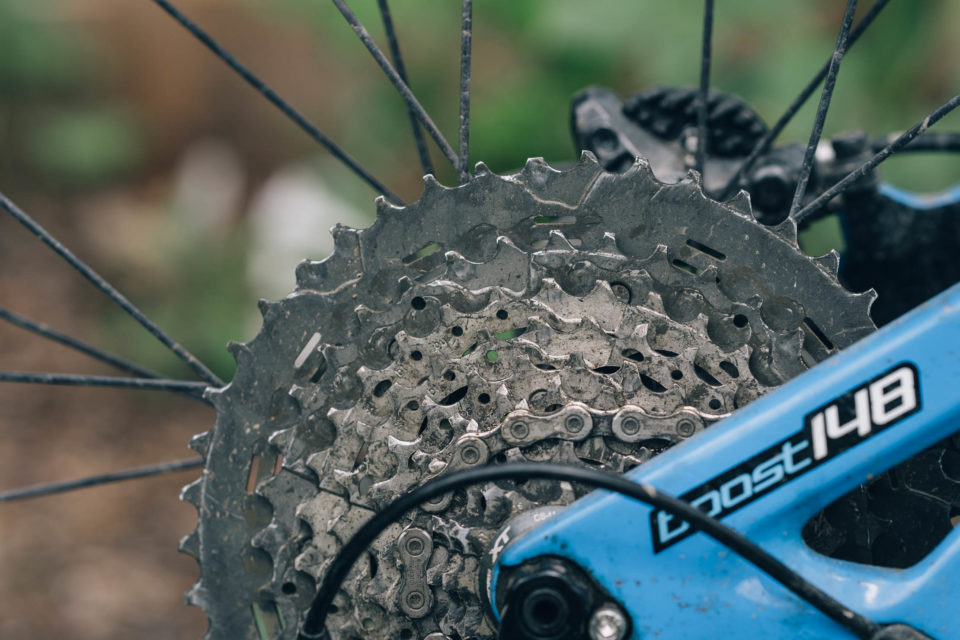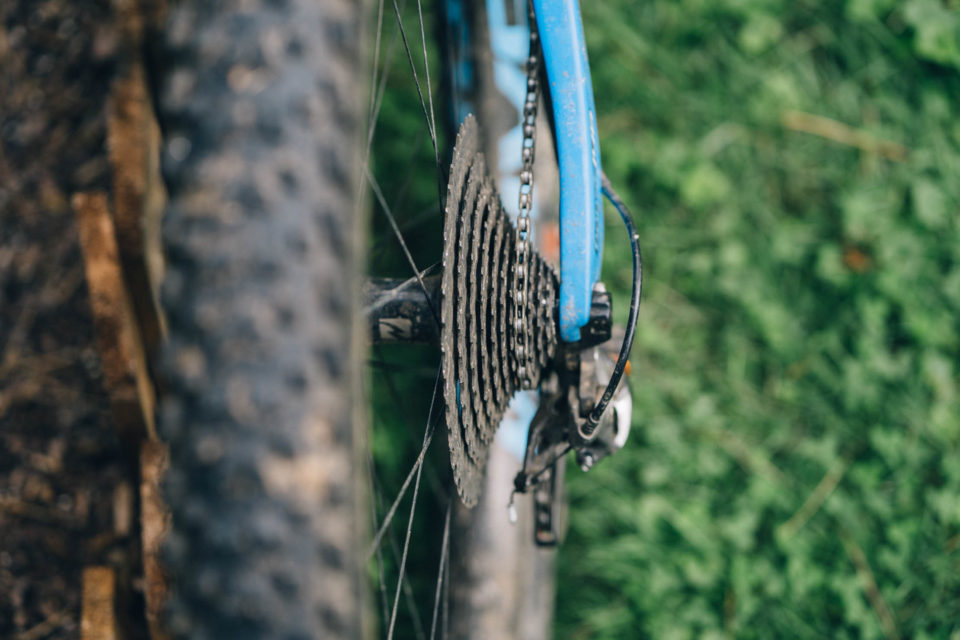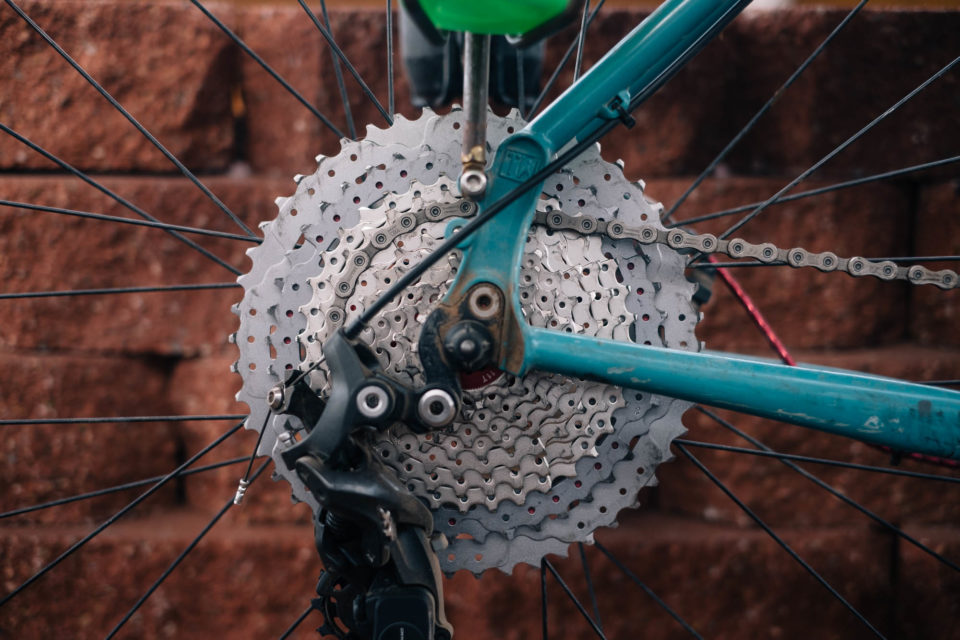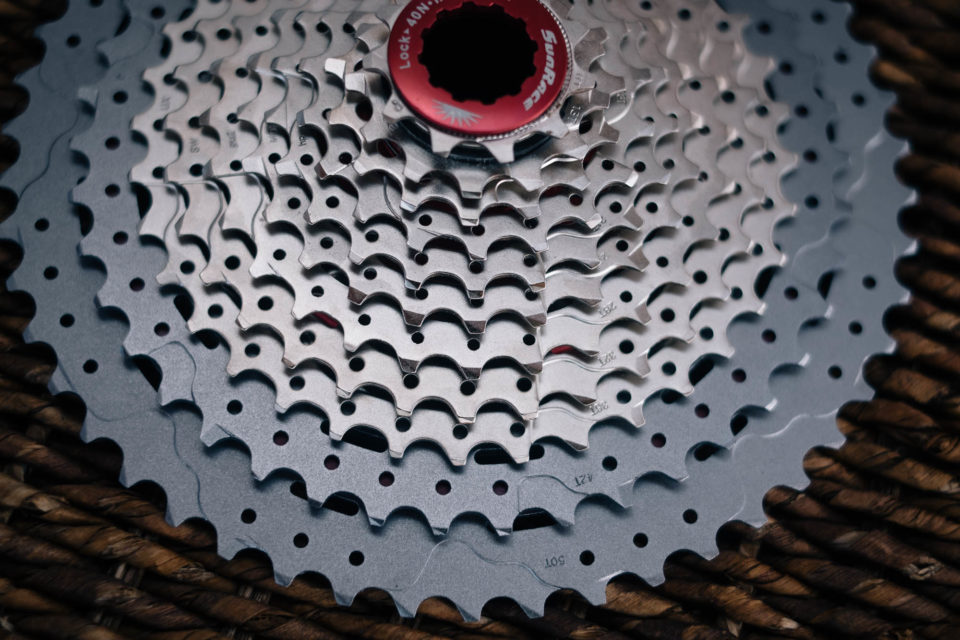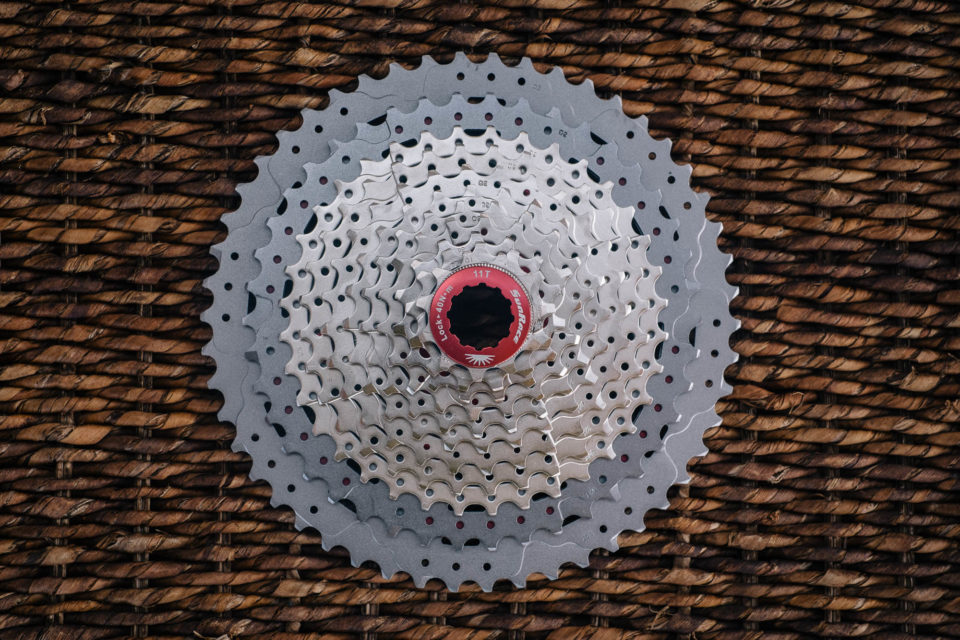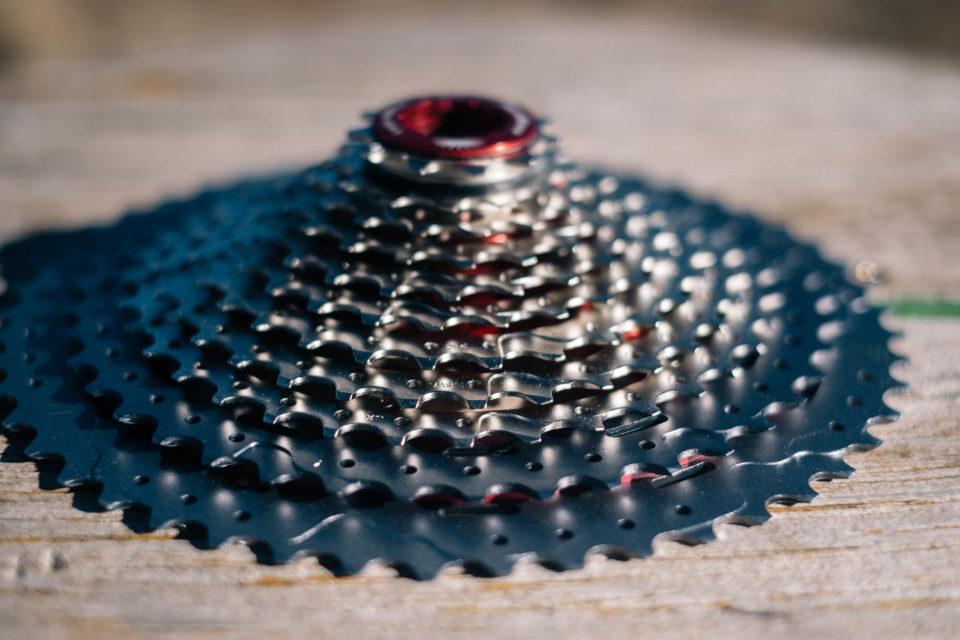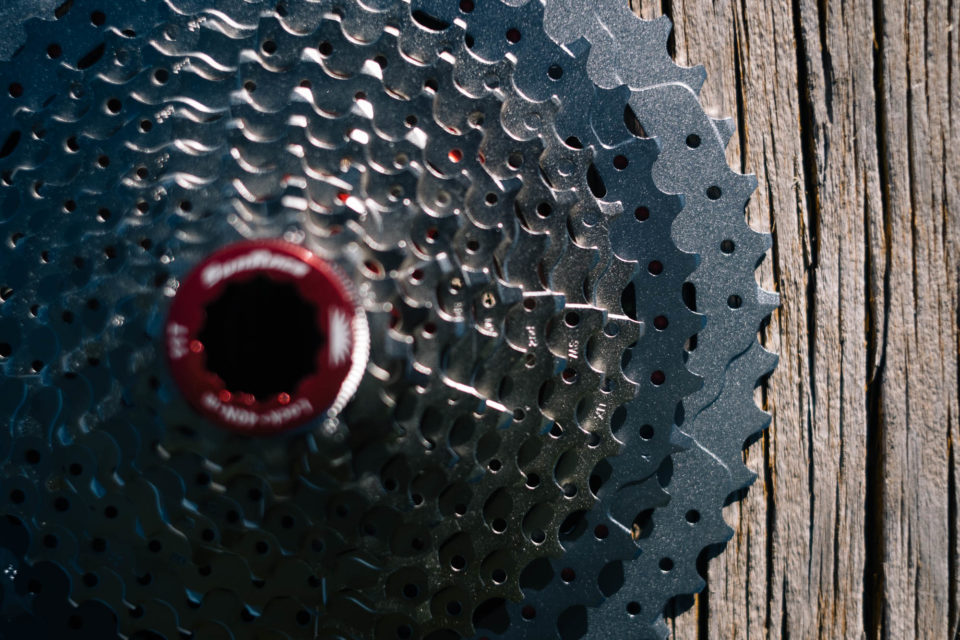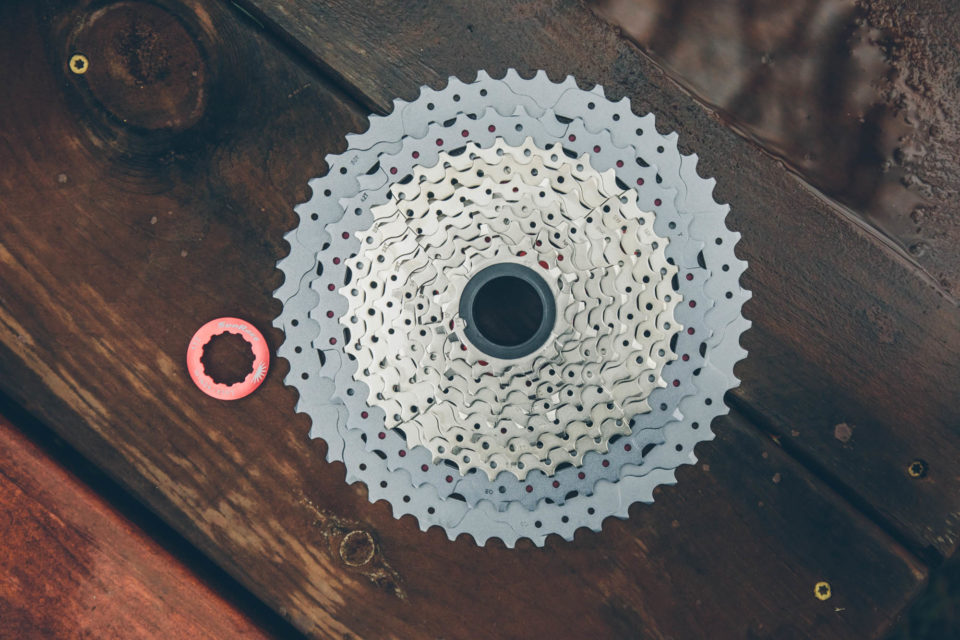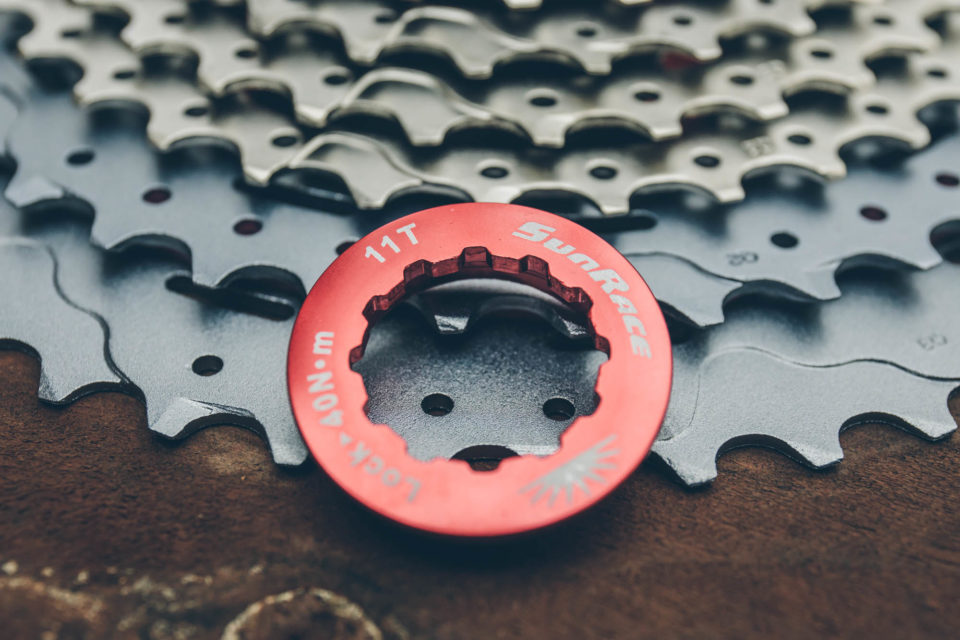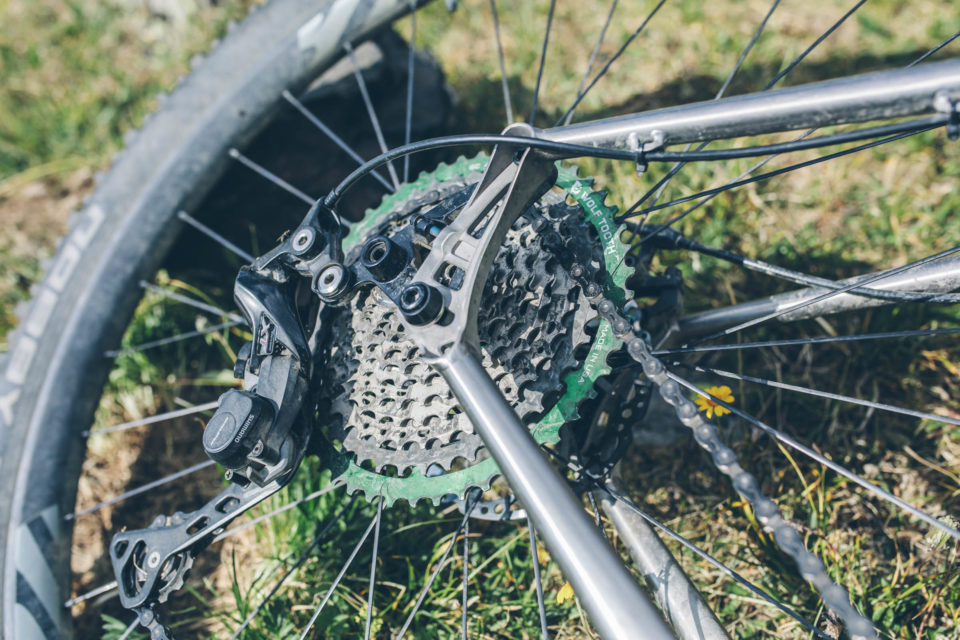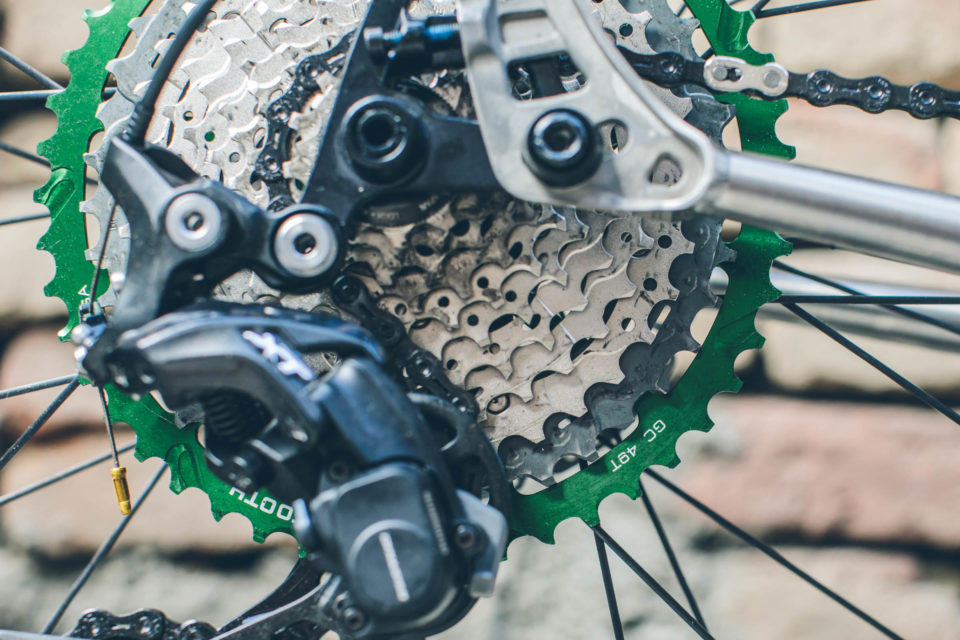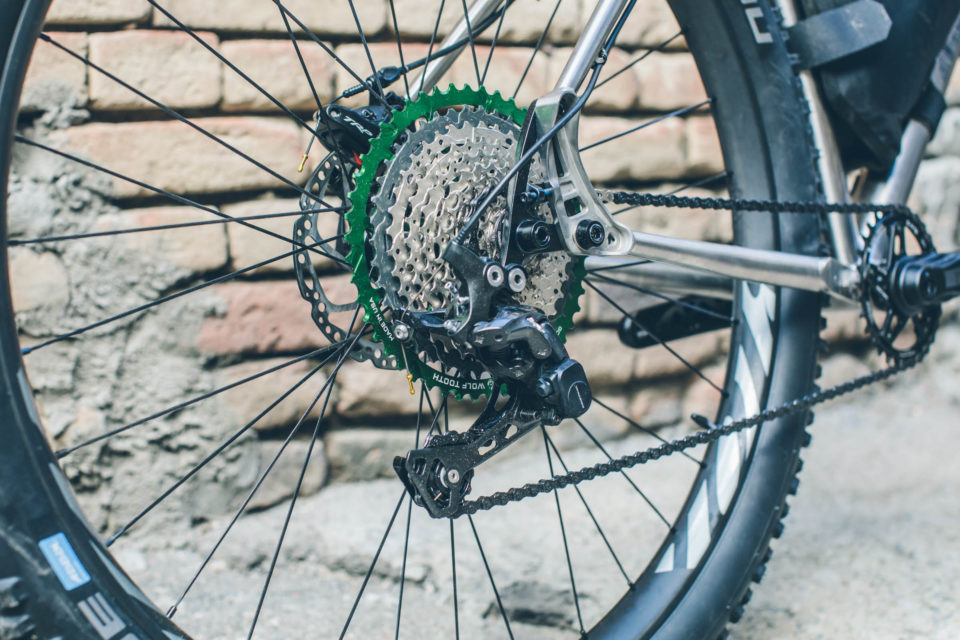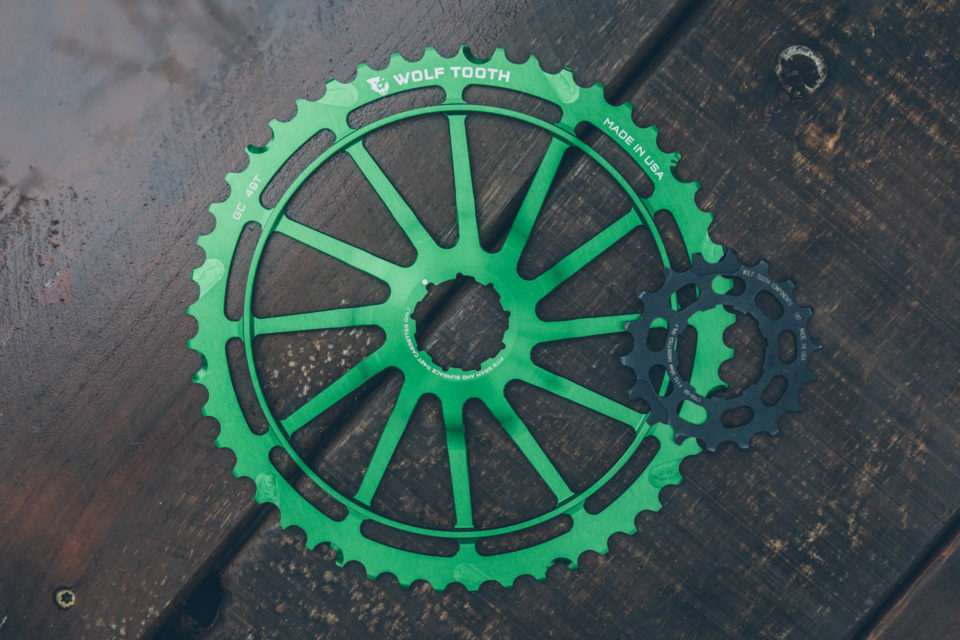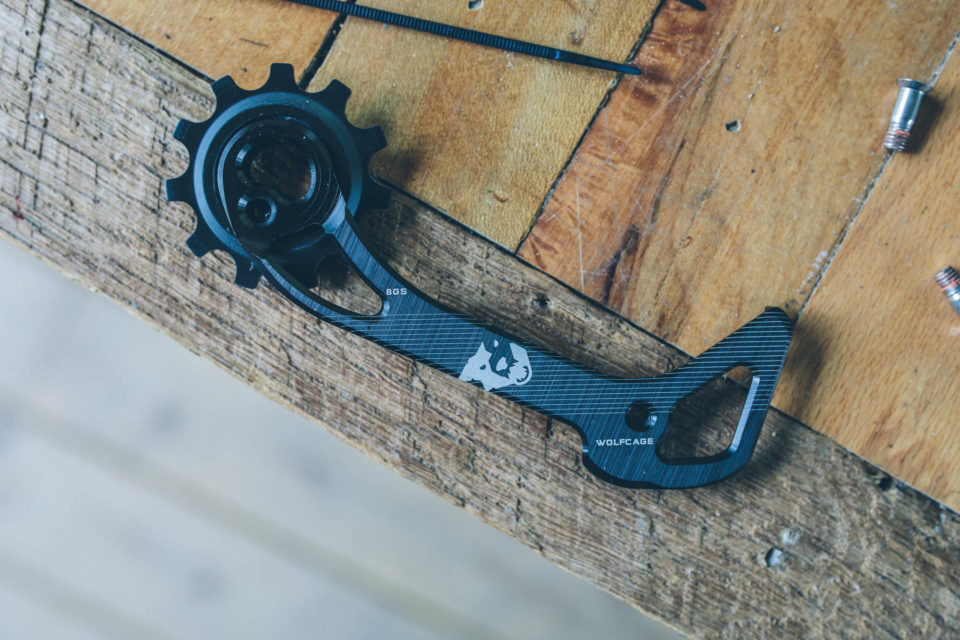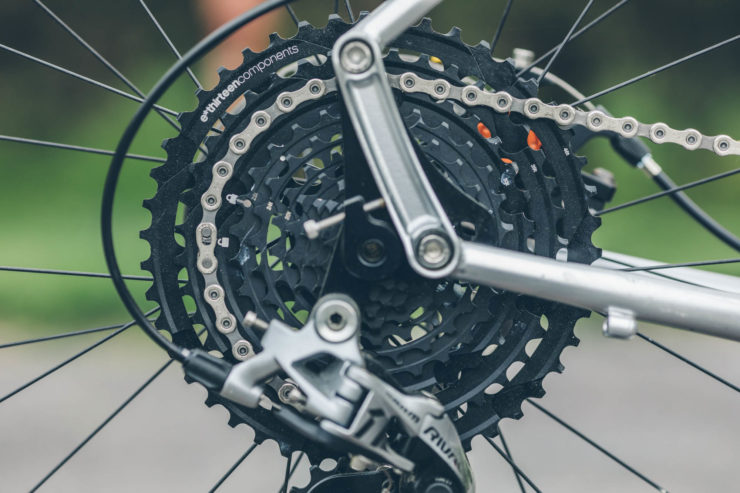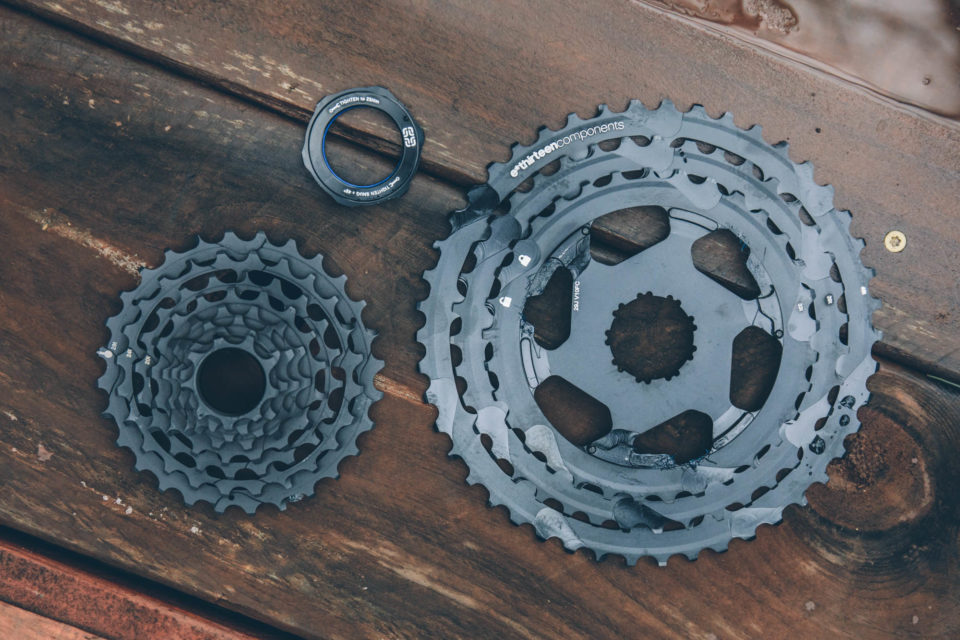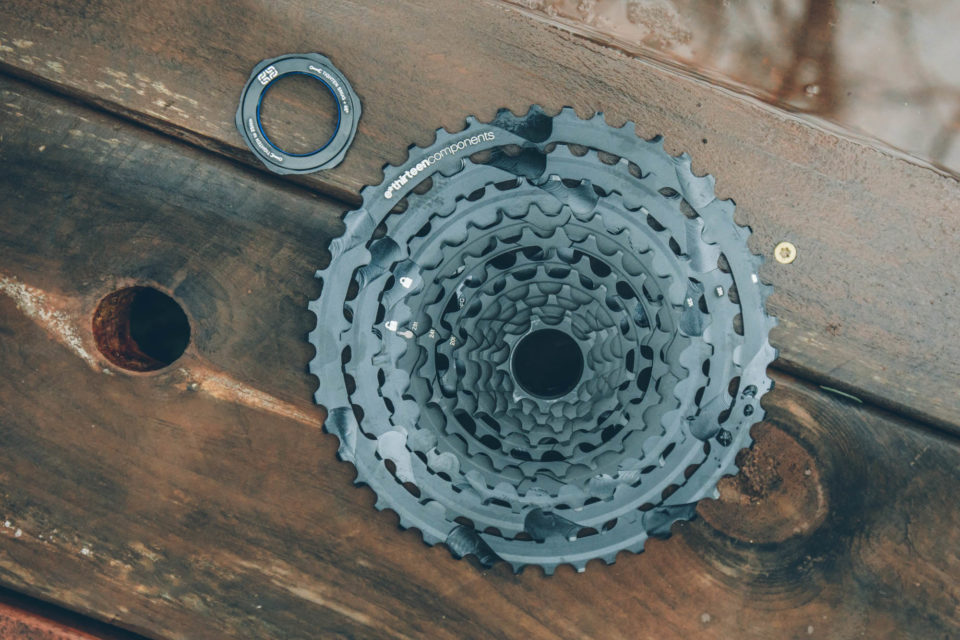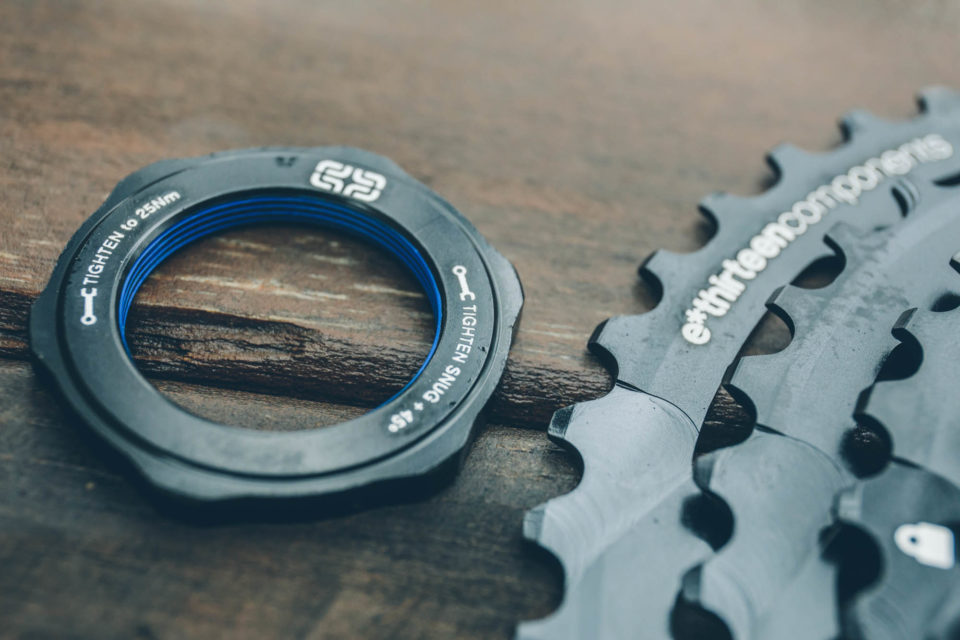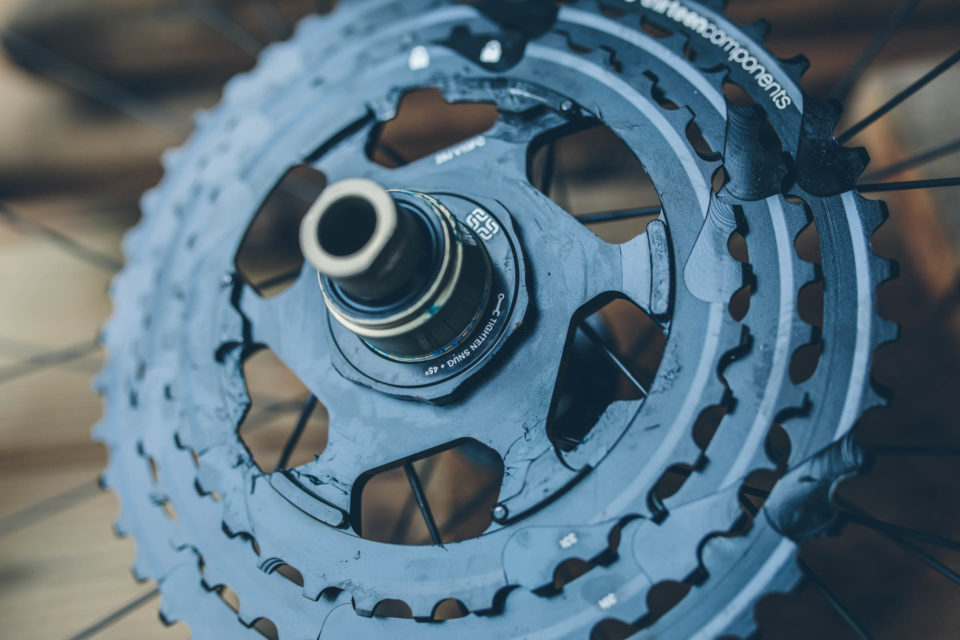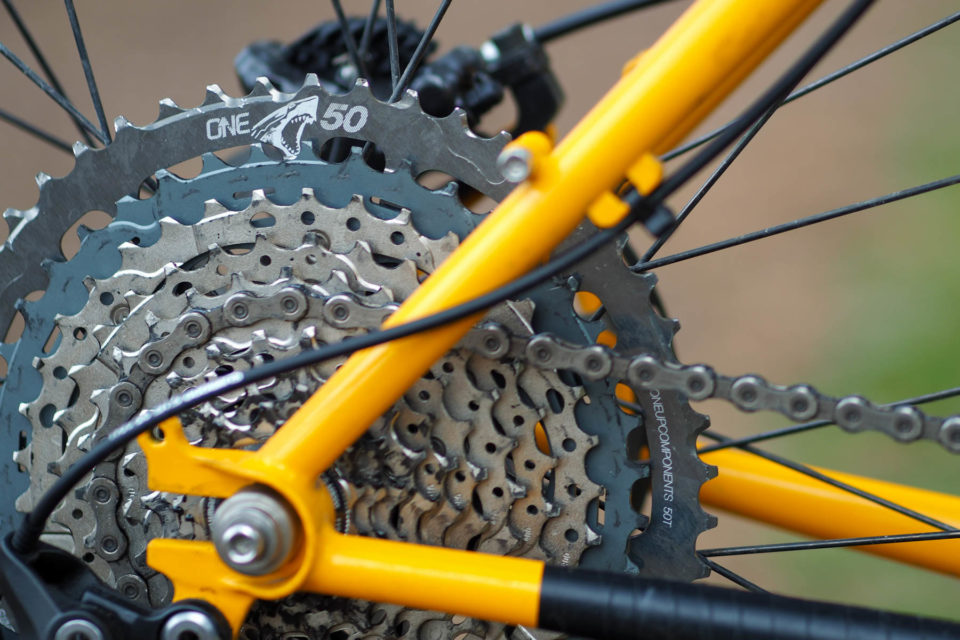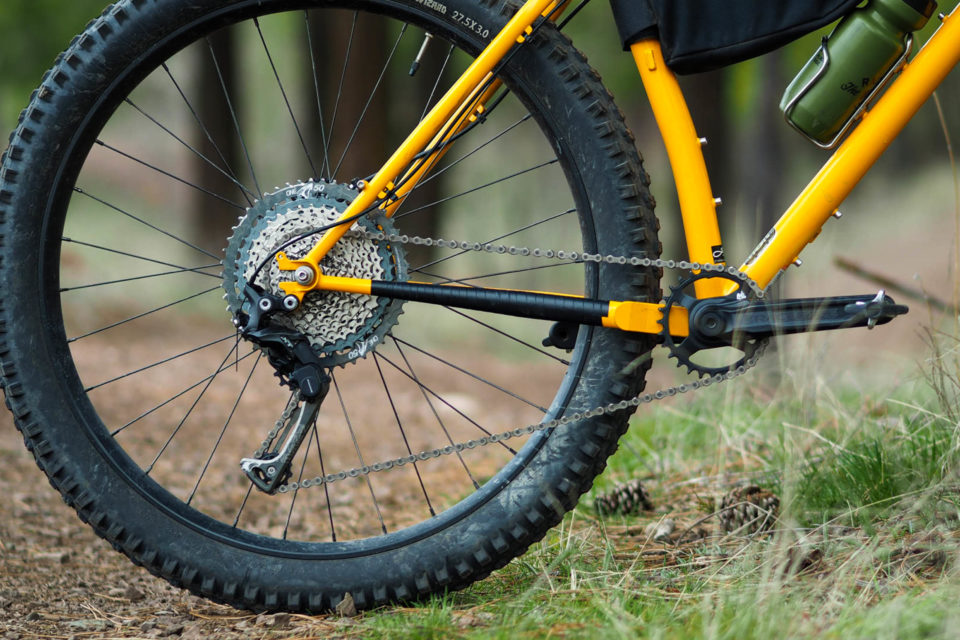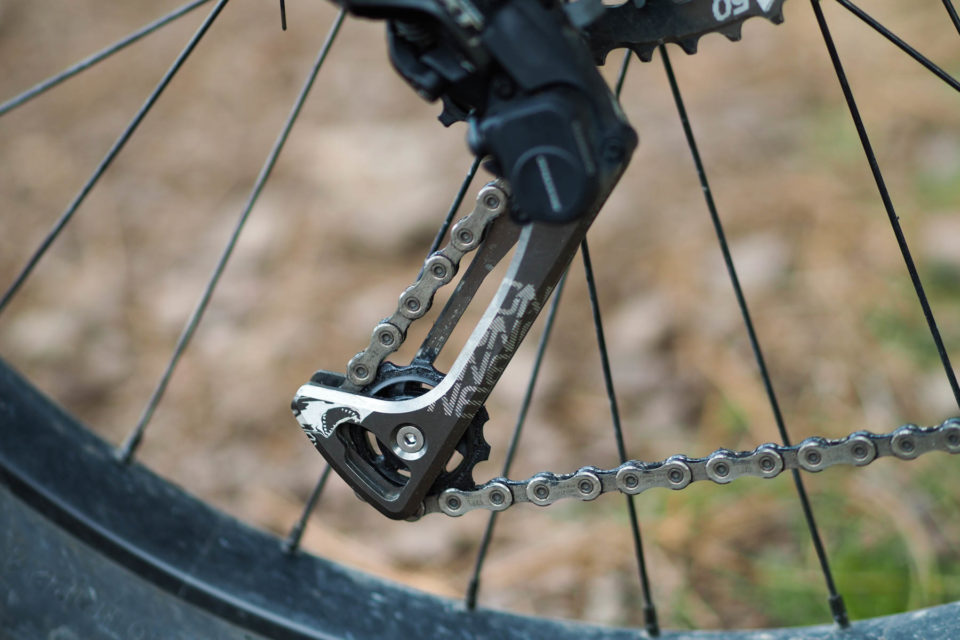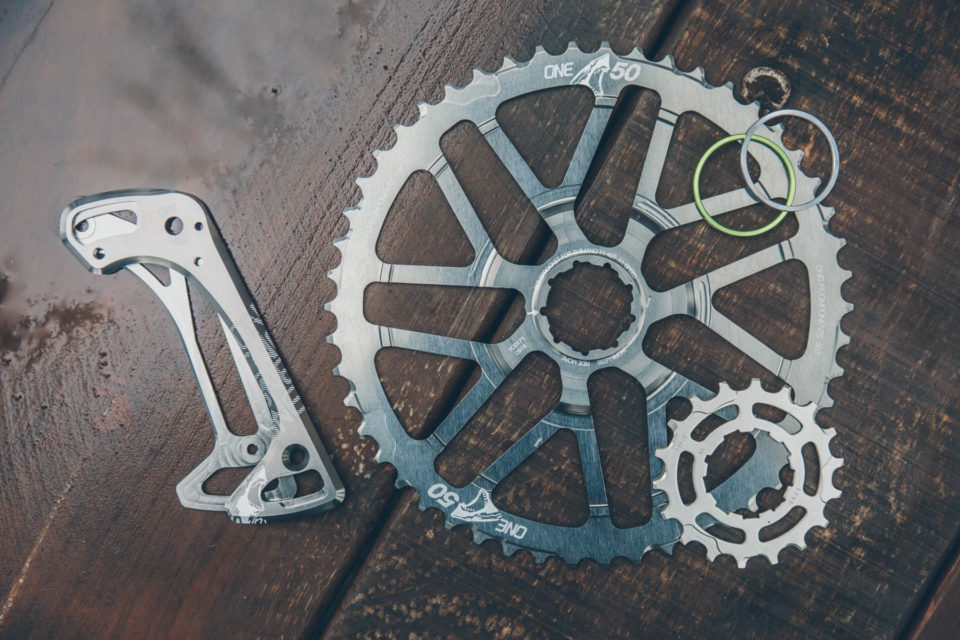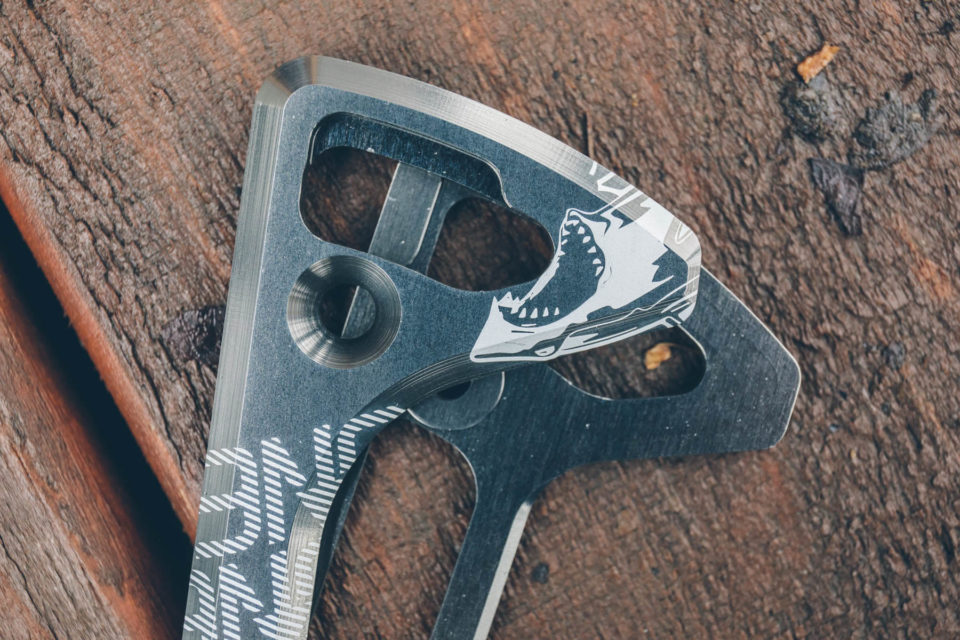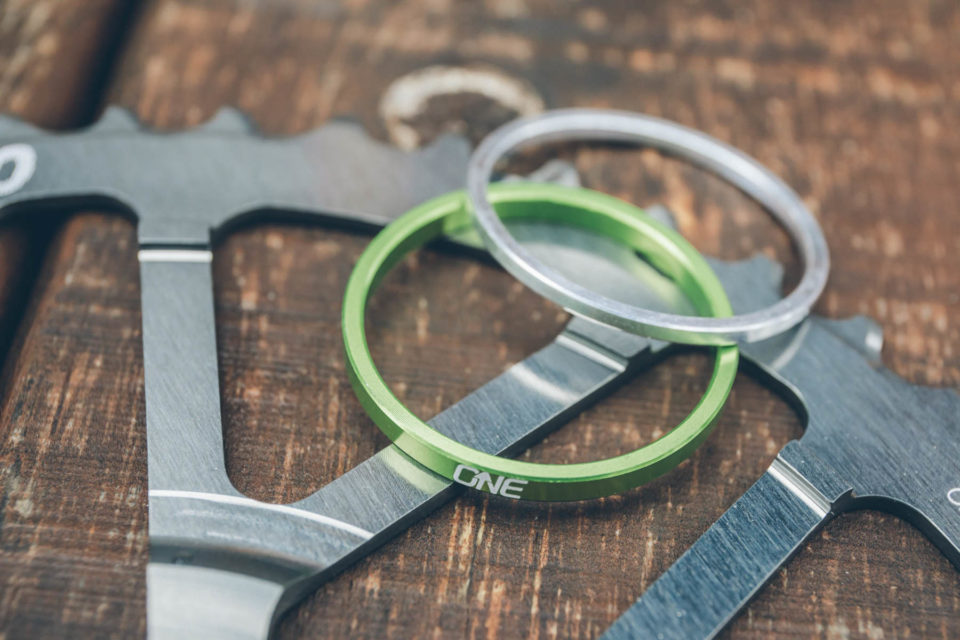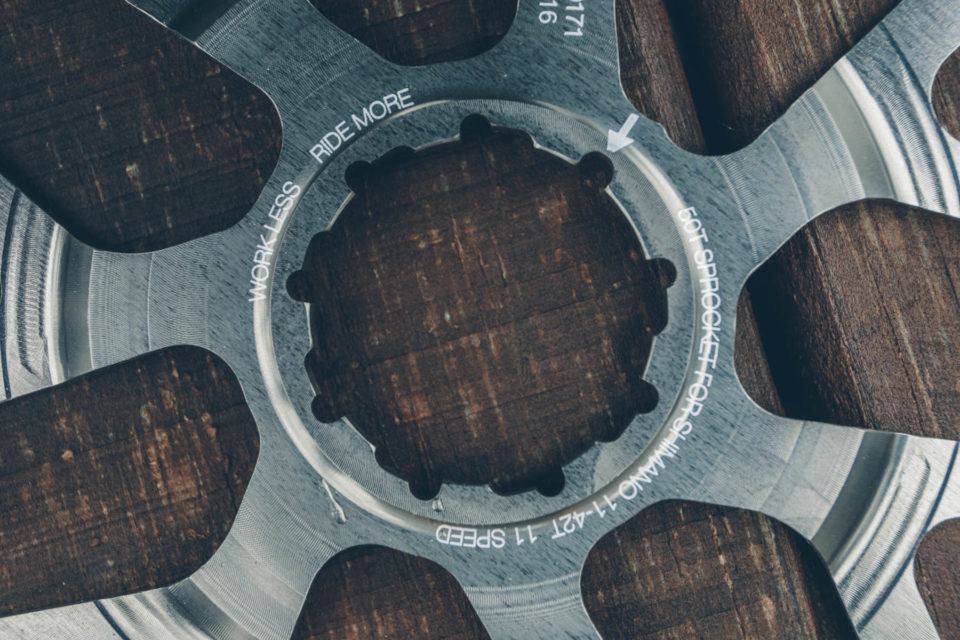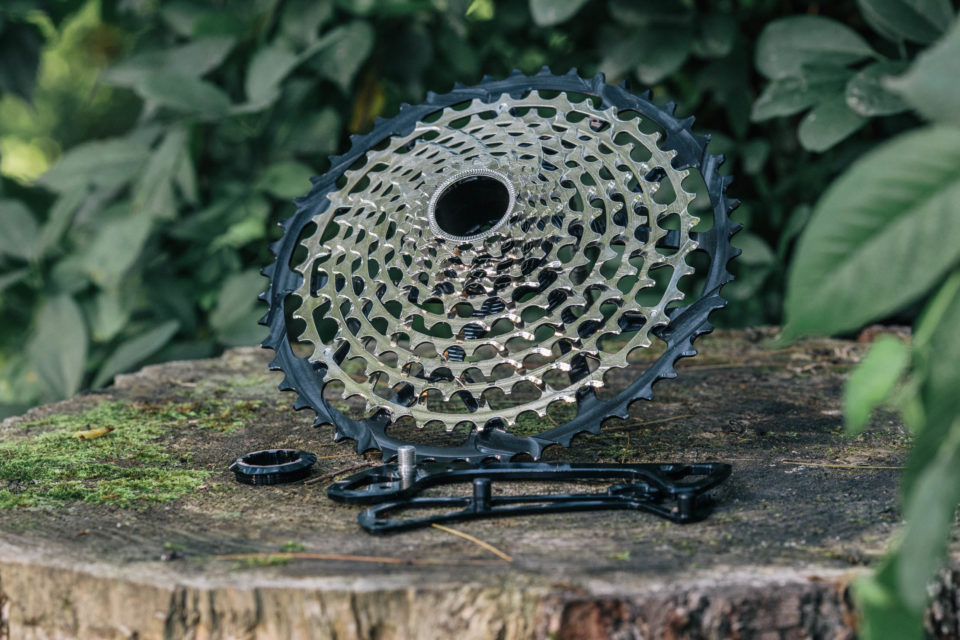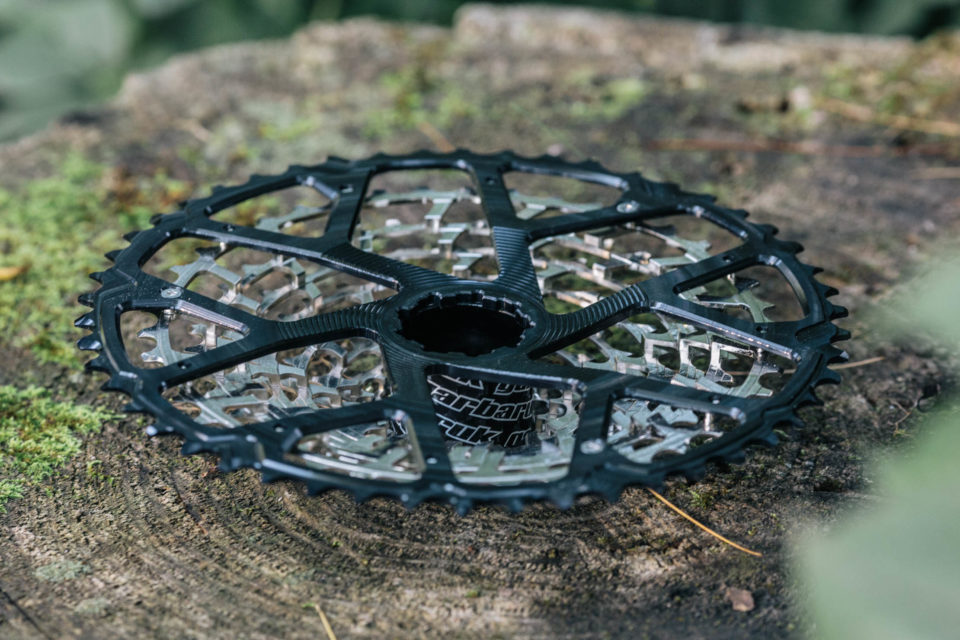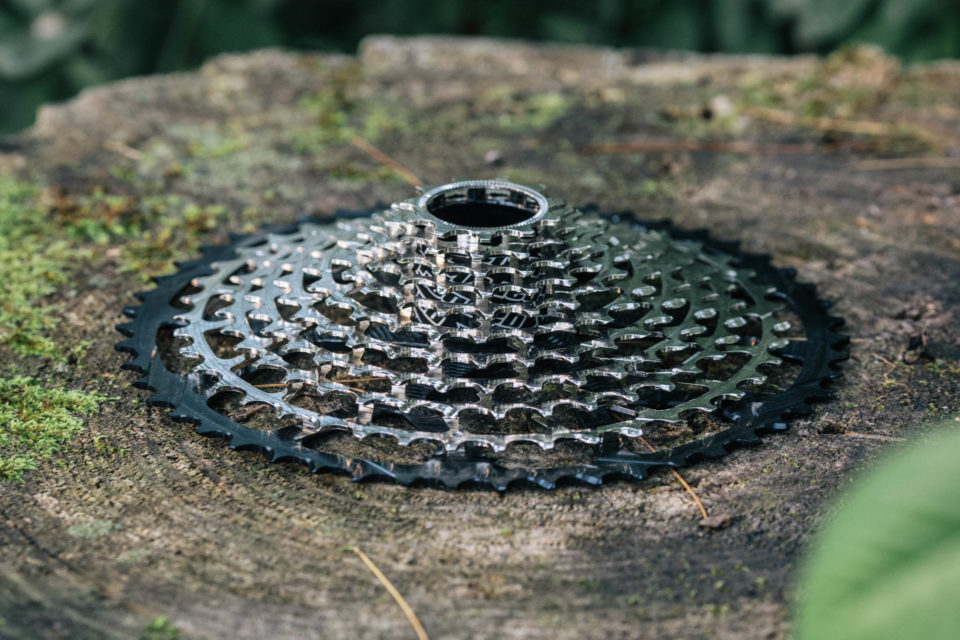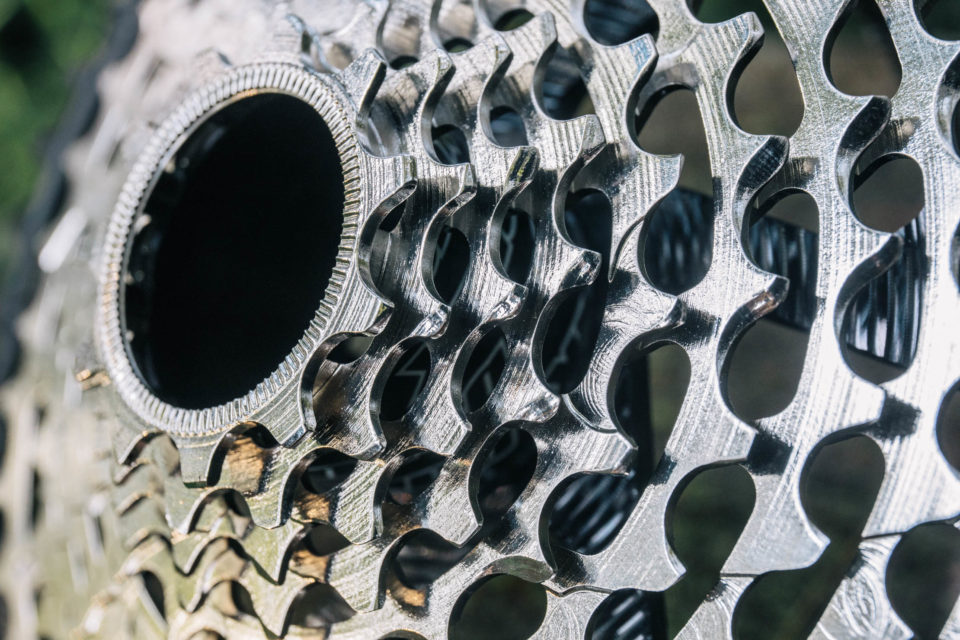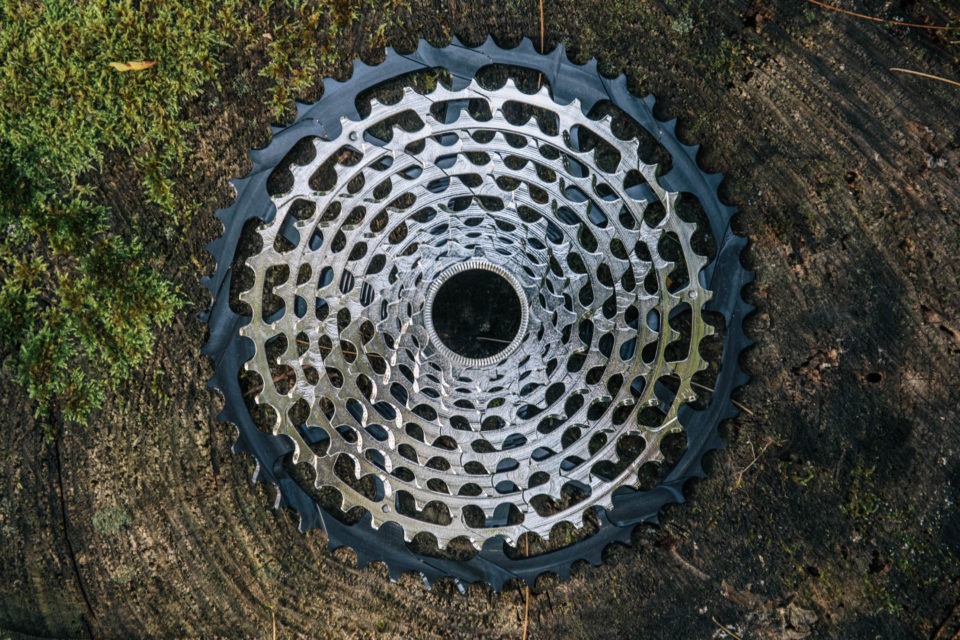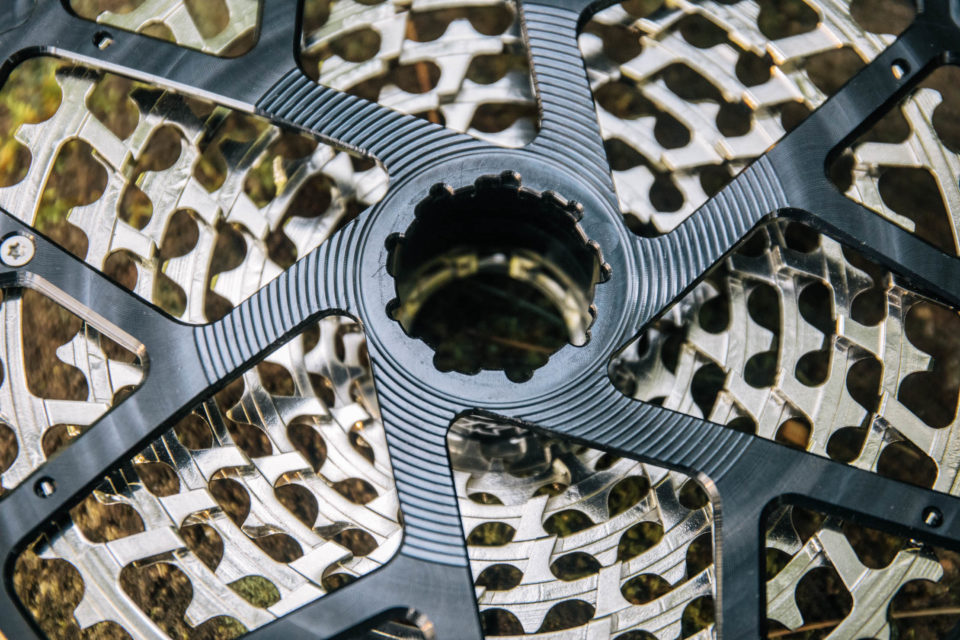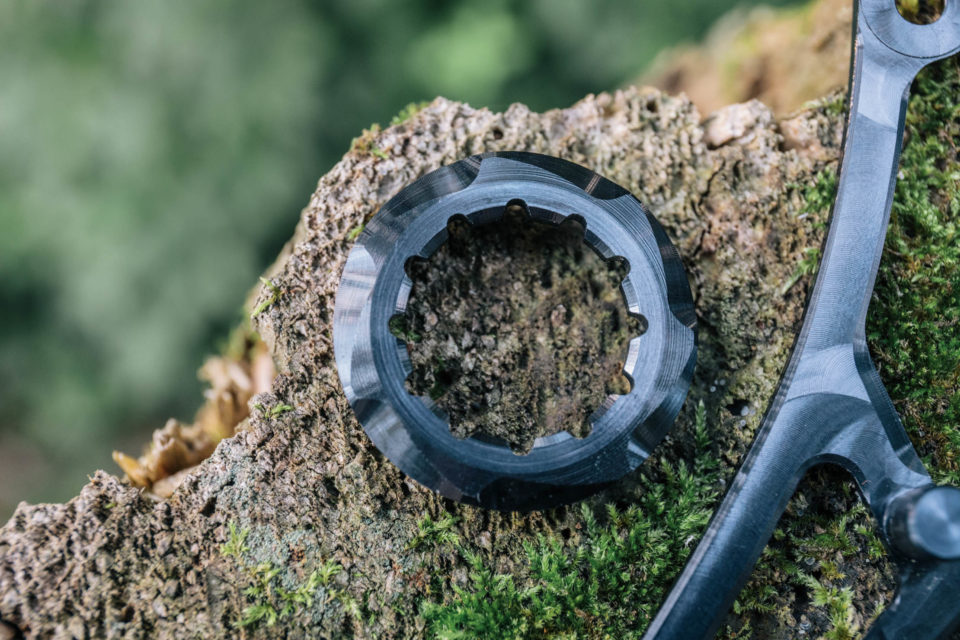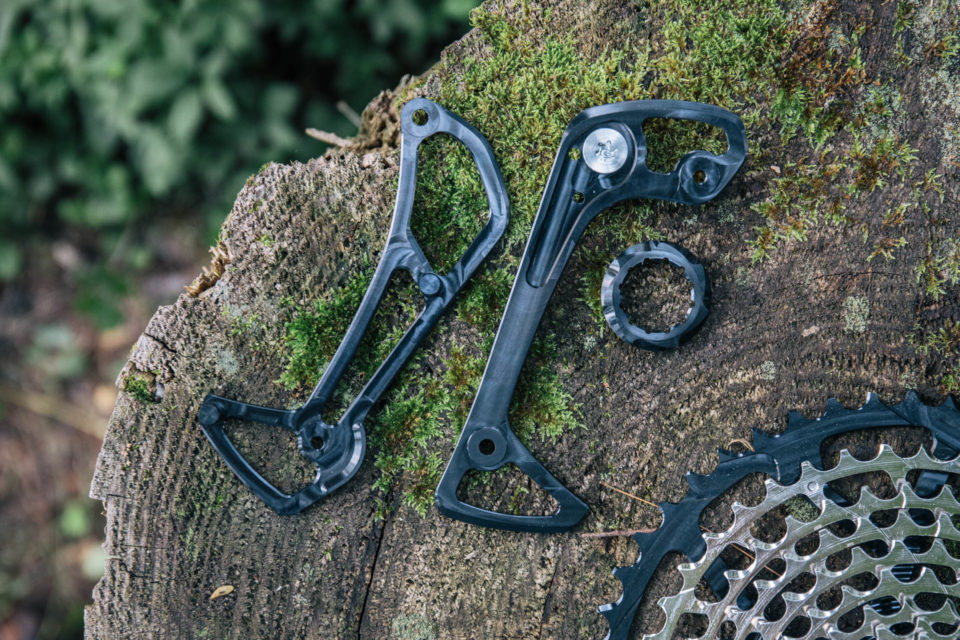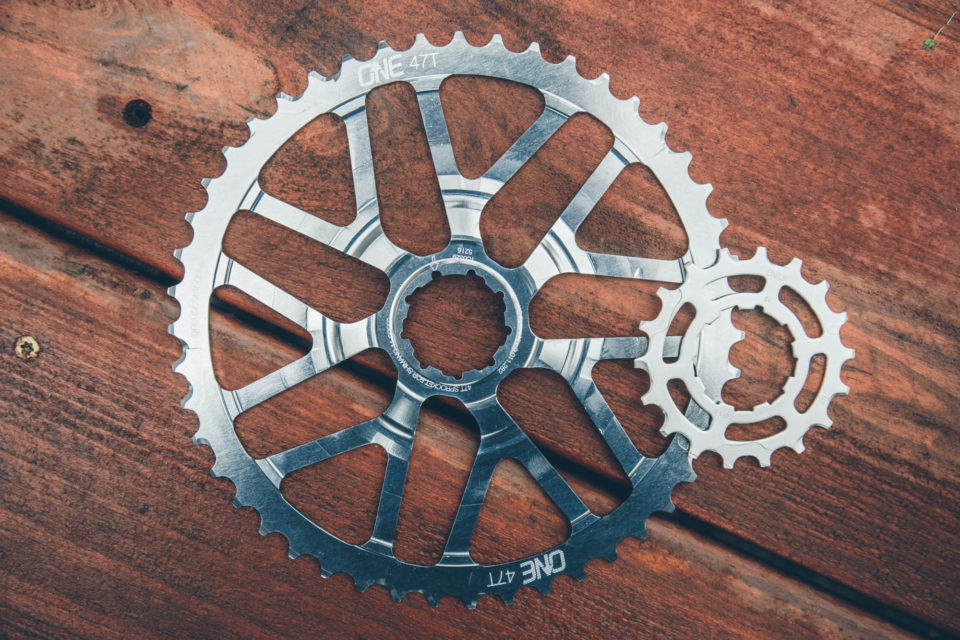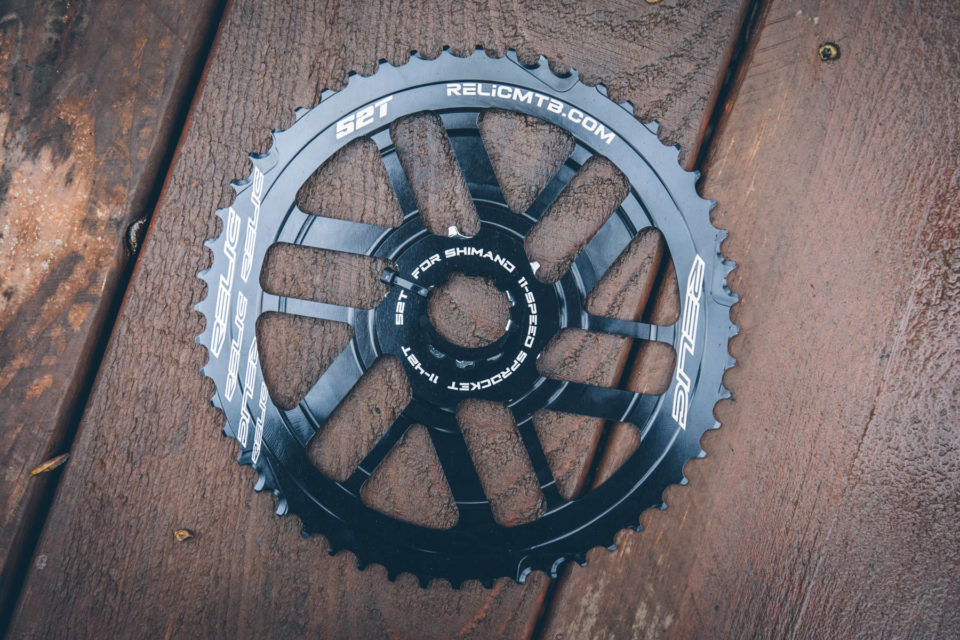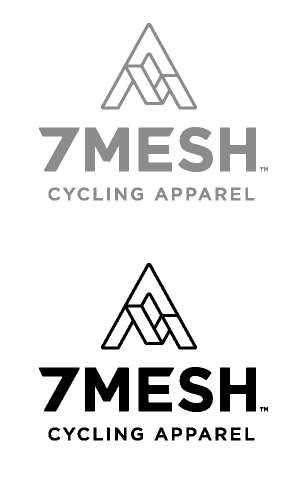Wide Range 1×11 For Bikepacking
Ever since SRAM’s 12-speed Eagle drivetrain was released a couple years ago, companies have been scrambling to increase the range possible with existing 1×11 parts. In this Low Down gear guide, we take a look at products that add range to your 1×11 or simply achieve a lower granny gear for pedaling a loaded bike…
PUBLISHED Jul 3, 2018
There are still quite a few holdouts using 2×10 MTB drivetrains—which, for the record, are perfectly fine—and even some folks sticking by 3×9. But, at this point, a solid majority of mountain bikers and many bikepackers have switched to a 1x drivetrain. Folks often justify the shift with the fact that a 1x system is simpler, which minimizes cables and generally cleans up the cockpit and the frame triangle. In addition, eliminating the front mech often frees up space needed to accomodate plus tires.
On the other hand, when transitioning to a 1×11 drivetrain, bikepackers face two issues. The first and most obvious is gearing that’s too high. Most of the time, out of the box drivetrains have a gear range that wasn’t designed for pedaling a bike with the added weight of camping gear and supplies, and as such, is geared too high for bikepacking. This often means it lacks a proper granny gear. What’s a proper bikepacking granny gear? Well, that’s a personal preference, often governed by your own physiology and the weight of your gear, and sometimes one that takes a bit of trial and error to figure out. Check here for a little guidance. For some of us, it’s around 18-20 gear inches. And for most of us mortals, this will require a front chainring that has fewer than 32 teeth when paired with the standard 11-42T cassette, especially when using plus-size tires. The simplest solution is to switch to a smaller chainring via a direct mount crankset. Direct mounts typically allow you to go as low as 26 teeth, which might be excessive for some situations, but, when compensating for heavy loads and large plus tires on steep climbs, it’s not beyond reason.
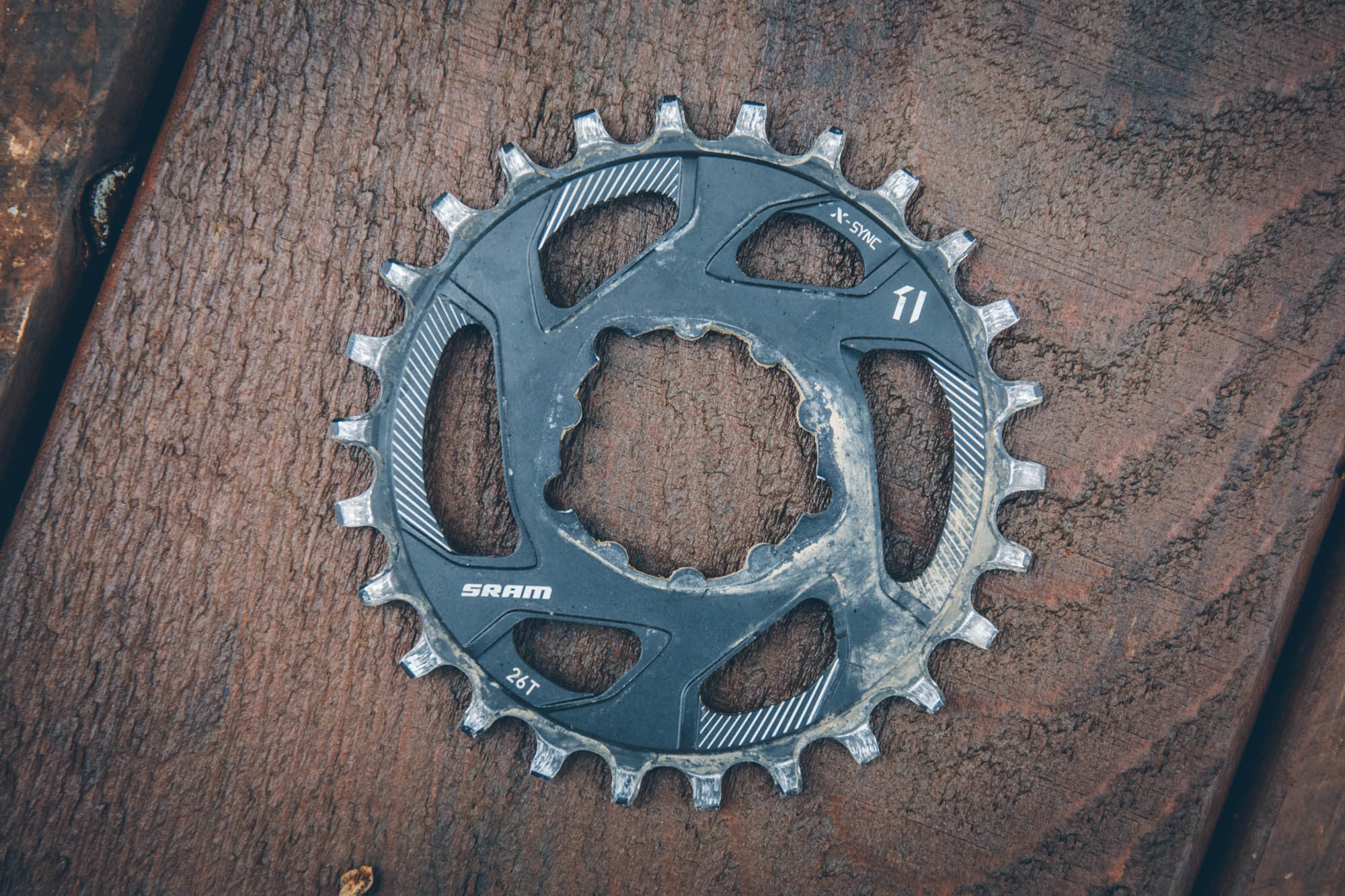
For the uninitiated, direct mount is not a standard, unfortunately. Each crankset manufacturer uses its own particular standard to allow chainrings or spiders to be bolted directly to the crank assembly. Here are a few, ordered roughly by popularity:
- X-SYNC/SRAM DM: SRAM
- Cinch: Race Face, Easton
- Hollowgram: Cannondale
- X-Type: Middleburn
- S-Works: Specialized
- Hope DM: Hope
- E13 DM: e13
- White Industries
Direct mount chainrings are often expensive, and also difficult to remove and replace. Most of the time changing a direct mount ring means removing the crankset altogether. So, if your bikepacking rig is also your trail bike, switching between rings will be costly and time-consuming. For that, there are a couple of products that help make life a little easier:
Wolf Tooth CAMO
With CAMO (Chainline And Material Optimization), Wolf Tooth’s modular direct mount chainring system, swapping chainrings is quick and easy once the spider is mounted to the direct mount crankset. And, Wolf Tooth offers a variety of Drop Stop chainrings for the system, ranging from 28-38T in both aluminum and stainless steel, round, or elliptical. Since the chainrings require less material to make, Wolf Tooth is able to offer them at a cheaper price than you’d normally pay for a Race Face Narrow Wide or SRAM X-Sync DM ring. The aluminum rings retail for about $45 and stainless for $99. The CAMO spider is available for Cinch, SRAM DM, e13, S-Works, and Cannondale direct mounts for $27.95. Read our full review.
One Up SWITCH
Similar to CAMO, OneUp’s SWITCH was developed to reduce the cost of replacement chainrings, increase compatibility with new offsets, and to make the process of changing your chainring much quicker and easier. SWITCH spiders are available for Cannondale, e13, Hope, SRAM DM, and Cinch standards, in 0mm, 3mm (BOOST), and 6mm offsets for $23. Rings are available in 28-36T, round or oval, for $40. We recently installed the SWITCH system, but haven’t had a lot of time to test it. First impressions are good and we’ll be sure to update this a few hundred miles down the road.
RANGE: 1X11 vs 2×10 vs 1×12
There’s one problem with moving to a small chainring to compensate for the load: the loss of the high end gears, which in the field translates to spinning out at relatively slow speeds. That brings us to the second issue people face when moving from multiple rings to just one in the front—the limited range of gears available with a standard 11-42T cassette.
If you’re reading this, you’re probably familiar with SRAM’s Eagle 1×12, which touts a wide 500% range, or the new Shimano XTR, which has 511%. To work out the range of 1x drivetrain, it’s as simple as calculating the range of a cassette: divide the largest cog by the smallest and then multiply this by one hundred (42 ÷ 11 = 3.82 x 100 = 382%). This is a big difference from the near 500% range provided by a standard 2×10 drivetrain. As an example, a 2×10 drivetrain with an 11-36T cassette combined with 36/24T chainrings on the crankset has a gear range of 491%. Reviewing the math, that’s (36 ÷ 24) 1.5 x (36 ÷ 11) 3.27 x 100 = 491%.’
- Shimano XTR 1×12 511%
- e*thirteen TRS+ 9-46T Cassette 511%
- SRAM Eagle 1×12 500%
- Garbaruk 10-50T Cassette 500%
- 2×10 (11-36t cassette + 36/24t rings 491%
- Relic MTB 52T Cog (11-52T) 473%
- Sunrace CSMX80 11-50T Cassette [EA5] 455%
- Wolf Tooth 49T GC Cog (11-49T) 445%
- One Up (11-47) 427%
- 1×11 (11-46T Cassette) 418%
- Standard 1×11 (11-42) 382%

Cassette Freehub Body Standards
A chainring swap has its own standards, but once you start messing with cassettes, there are other configurations to contend with. With mountain bikes, we have two main cassette freehub body standards. There are more, but a vast majority of our audience will be using one of these two. This will change with Shimano’s new Micro Spline, which will likely gain in popularity over the next couple of years.
SRAM XD
SRAM XD is the newer of the two main standards. It is only compatible with XD cassettes that utilise a spline, coupled with a small external threaded section. XD is used with all of the new Eagle 1×12 drivetrains as well as the newer SRAM 1×11 cassettes, among others.
Shimano HG (8/9/10/11)
This is the Shimano “standard” freehub that is most widespread and will accept the majority of 8/9/10/11-speed MTB cassettes that are non-XD: all Shimano MTB cassettes, older SRAM cassettes, and the SRAM NX 1×11 cassette (PG-1130).
These days, there are a lot of worthwhile products out there to increase the range of a 1×11 setup. But, with prices of 1×12 inching down, is it worth it? To answer that question, consider what all is required to make the switch, and what parts you have on hand. For example, moving to the relatively affordable Eagle GX requires an XD hub driver. And if you have some 1×11 parts already, there are a lot of options:
Shimano 11-46t XT CS-M8000 Cassette
Announced in February of 2016, Shimano’s 11-46T XT cassette was a leap forward for cassettes. Prior to it, there were a few 44T mods, but 46T was the pie plate cog of the day. The biggest draw is that it can be used with existing parts, including the prevalent Shimano HG freehub driver. Instead of moving to SRAM, which requires a new XD freehub driver, the CS-M8000 fits on the classic HG that we’re all familiar with.
With the exception of the alloy 37 and 46T sprockets, all the cogs on the XT cassette are steel, which makes for a durable cassette if you use the 37 and 46T cogs sparingly, as a bailout on the ultra-steep stuff. We’ve been using one for about a year (shown) and it’s still in great condition after many trail rides, although the 37T cog is showing signs of wear.
Overall, while there is a significant jump from the 37 to 46T cog, which is slightly annoying, though it shifts fairly smoothly. And, if you’re not concerned about weight, there is a slightly less expensive SLX version that is very similar. I will add that I think the OneUp or Wolf Tooth expanders with the 11-42T cassette might be a marginally better option as far as shifting steps.
- Range 418%
- Freehub Compatibility Shimano HG
- Weight 440g
- MSRP $109
- Manufacturer’s Details Link
Sunrace CSMX80 11-50T [EA5]
Wow, what a sight to behold! Eager to give a wide range 1x drivetrain a go for bikepacking (but not wishing to fork out for a whole new drivetrain), I set the MX80 up with a fairly standard issue 11-speed Shimano XT derailleur (XT RD-M8000, GS medium cage). Once the B-tension screw had been adjusted to clear that massive outer ring, shifting proved reliable and precise, though I should point out that Shimano’s 11-speed medium cage derailleurs technically max out at 46T. Given the extra cogs over the 42T SunRace cassette that it replaced, I was able to bump the front chainring from a 28T to a 32T or 34T, providing a great cruising gear without sacrificing the low end range I like for bikepacking. We’re still long term testing the cassette, but first impressions are very good. Given that all the cogs—bar the outer two—are steel, this should bode well for longevity. Weighing in a little heavier than Shimano or SRAM’s offerings, the MX80 isn’t going going to be the racer’s choice. But for everyone else, this is a great, affordable way of making the jump to a genuinely useable wide range 11-speed setup. Note that SunRace also makes the CSMX80 11-46T [EAZ] with a range 418%. It weighs 464g and sells for $79.
- Range 455%
- Freehub Compatibility Shimano HG
- Weight 512g
- MSRP $100
- Manufacturer’s Details Link
Wolftooth 49T GC Cog + WolfCage Kit
Wolf Tooth is a pioneer when it comes to cassette expander cogs. They first started tinkering with 40 and 42T cogs for 10-speed cassettes and now have a slew of offerings, including 45 and 46T cogs. The one we’ll focus on here is the 49T GC Cog, of which Wolf Tooth makes a version for SRAM and SunRace cassettes, and another for Shimano cassettes. The GC 49 cassette extender allows you to modify your 11-speed 11-42T cassette to create a wide range 11-49T cassette. To achieve relatively smooth shifting, the GC includes an 18T cog that replaces the 17 and 19T rings. The result is a cassette with a 455% range and a great granny gear.
As mentioned, there are two versions of the GC available—one for SRAM and SunRace, which works with SRAM PG-1130 11-speed NX cassettes and SunRace 11-speed 11-42 cassettes, and one for Shimano, which requires the longer WolfCage derailleur cage kit and works with Shimano 11-speed 11-42 and 11-46 cassettes. We installed one to the Timberjack with an XT derailleur for our Caucasus trip last summer and were very happy with the result.
Overall, it’s easy to install, offers smooth shifting, and seems durable, so far. We’ll be sure to report back once we crack the thousand mile mark.
- Range 445%
- Freehub Compatibility Shimano HG
- Weight 110g (49T cog), 22g (18t cog), 22g (WolfCage)
- MSRP $125 Shimano, $90 SRAM/Sunrace
- Manufacturer’s Details Link
e*thirteen TRSr and TRS+ Cassettes
The e*thirteen TRSr 9-46T cassette is one of the widest range 11-speed cassettes out there. With a 511% gear range, it’s even wider than 1×12 Eagle. What makes the TRSr particularly interesting for those on drop-bar rigs is that 46T is about as big as the newer road 1×11 derailleurs, such as Rival and Force, can go.
The e*thirteen TRSr’s design allows the cassette to be separated into two pieces. To do this, the largest three cogs, 33-39-46T, are made from aluminum, and get mounted to an XD driver body with a lockring that requires an e*thirteen bottom bracket tool to install. Fortunately, it ships with the cassette. The other cluster of eight rings is machined from a single piece of steel and locks into the aluminum cluster with the help of a chain whip. Obviously, the three large aluminum cogs are more susceptible to wear than the steel cluster, so, according to e*thirteen, you’ll be able to purchase and replace each cluster independently.
So far, in our brief test, we are quite impressed with the TRSr. It was fairly easy to install and seems to shift very well with its unique array of cogs: 9-10-12-14-17-20-24-28-33-39-46T. One concern is that it would be tricky to remove or adjust in the field without a chain whip and an specialized bottom bracket tool. And, at $350, it’s certainly not cheap, but you can get the TRS+ for less than $250 with the same range.
- Range 511%
- Freehub Compatibility XD
- Weight 287g
- MSRP $350
- Manufacturer’s Details Link
OneUp Shark 11-50T Kit
The OneUp Shark is a cassette expansion kit for those running 11-42T Shimano cassettes. The kit includes an 18T nickel-plated hardened steel cog and a monster 50T cog and longer cage for the rear derailleur, both made of 7075-T6 aluminum. If you’ve got a Shimano 11-42 drivetrain already, the 50T Kit is going to offer a 455% gear range and a super-low granny gear to make climbing easier.
While we expected clunky shifting and a worrisome chain line, we were pleasantly surprised to have nearly the opposite experience. The only real concern is the long-term durability of the aluminum 50T cog, so we’ll make sure to update our full review later this summer.
For those with a DT Swiss hub, OneUp also offers a DT Mini Driver that allows an additional 10T ring to be installed to gain the full 500% range of SRAM Eagle. Read our full review here.
- Range 455%
- Freehub Compatibility Shimano HG
- Weight 50T + 18T: 80g, Shark Cage: 9g
- MSRP $125
- Manufacturer’s Details Link
Garbaruk 10-50T Cassette
Garbaruk is a company based in Ukraine that’s been making bike components for about a decade. They offer three wide range cassettes, a 10-46T (10-12-14-16-19-22-26-30-36-42-46T), a 10-48T (10-12-14-16-19-22-26-30-36-42-48T), and a 10-50T (10-12-14-16-19-22-26-30-36-42-50T). They tout their wide range offerings as “precisely crafted lightweight 11-speed MTB cassettes.” Each is available for Shimano or SRAM XD and the range varies in price from $263-$311 USD. All of the rings are made of steel except the largest, which is made from 7075-T651 aluminum alloy. Garbaruk also offers derailleur cages for the 10-48 and 10-50T models, enabling your rear mech to work with these ultra wide range cassettes.
We received this cassette just before posting, but on first inspection it seems very solid. It’s incredibly lightweight given its construction. The smaller ten cogs are machined from a single piece of chromoly steel that keys into the aluminum 50T cog, which is secured with three Torx head screws. This means you could technically replace the big cog if it were to wear out faster than the others. We look forward to installing it, testing, and reporting back.
- Range 500%
- Freehub Compatibility Shimano HG and XD
- Weight 319g
- MSRP $275 + $36 for the RD Cage
- Manufacturer’s Details Link
OneUp 47T Sprocket +18T
Why 47 teeth? Perhaps it’s to one-up Shimano on their—at the time—innovative 11-46T cassette. Or, maybe it’s because 47T is about as big as you can get without derailleur cage modifications, so it’s a quick and easy install. The OneUp 47T Sprocket works with SLX/XT (M7000/M8000) 11-42T cassettes and gives you 5T jumps in the bigger sprockets (37-42-47T) which, according to OneUp, makes the lower gears extremely useable.
Like the Shark Kit, the 47T kit includes a 7075-T6 aluminum 47T cog and a nickel plated hardened steel 18T cog. The 18T ring replaces the 17 and 19T cogs to provide the following array: 11-13-15-18-21-24-28-32-37-42-47T (11-42T). The kit weighs 68g more than the stock 11-42T cassette.
- Range 427%
- Freehub Compatibility Shimano HG
- Weight 68g more than standard cassette
- MSRP $90
- Manufacturer’s Details Link
Relic 52T + 16T SPROCKET
The Relic cassette cog is offered in 50 or 52 teeth and works with Shimano cassettes: SLX (M7000), XT(M8000), and XTR(M9000). The 16T sprocket replaces the 15T and 17T for ideal shifting progression. We haven’t tested it, but it looks similar in design to others. The massive 52 would likely require a long derailleur cage.
- Range 473%
- Freehub Compatibility Shimano HG
- Weight 148g
- MSRP TBD
- Manufacturer’s Details Link
Please keep the conversation civil, constructive, and inclusive, or your comment will be removed.


